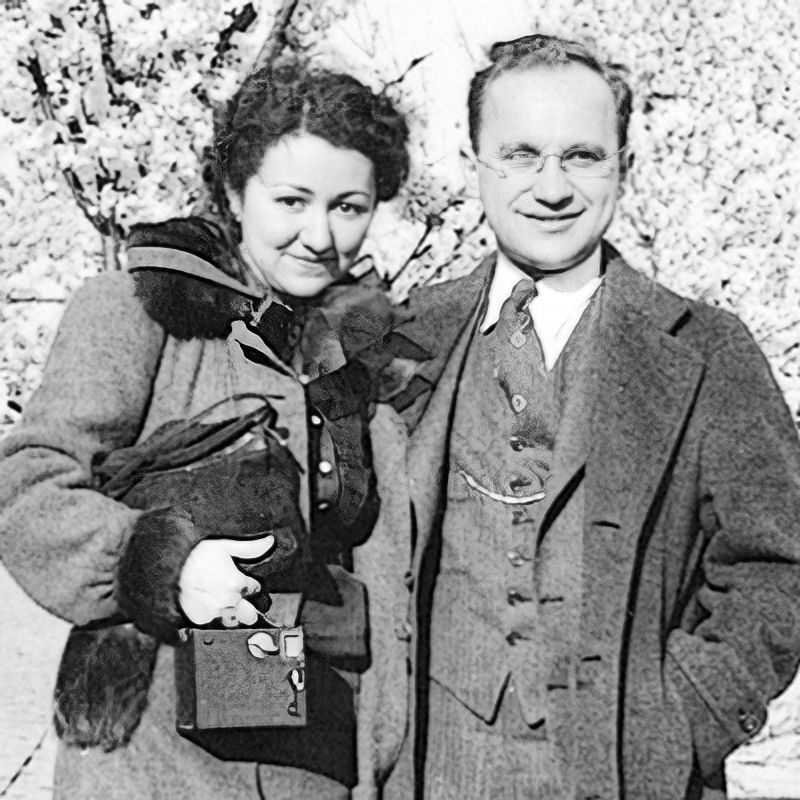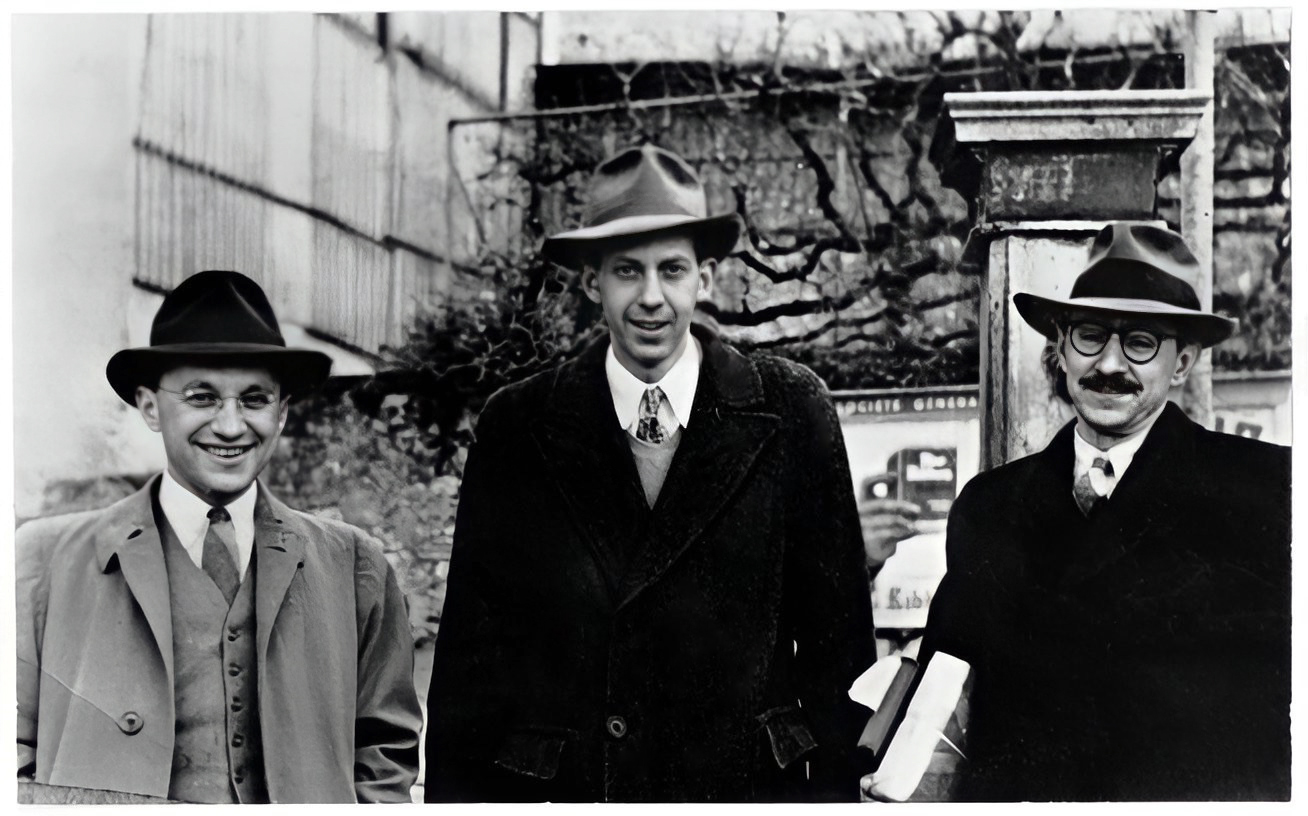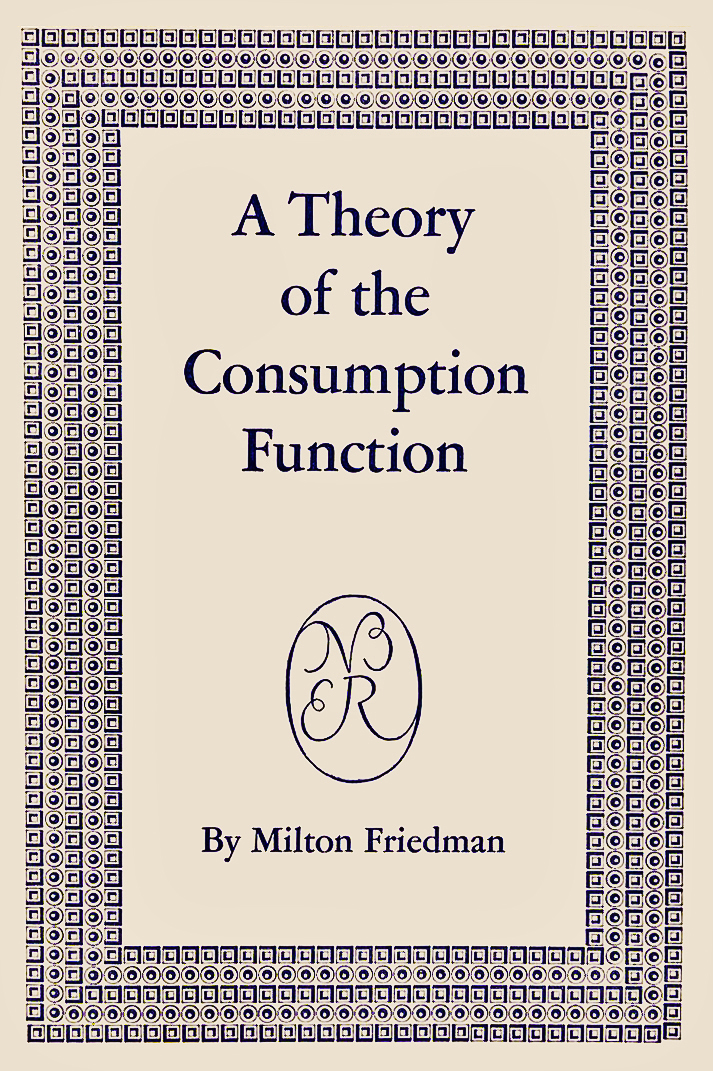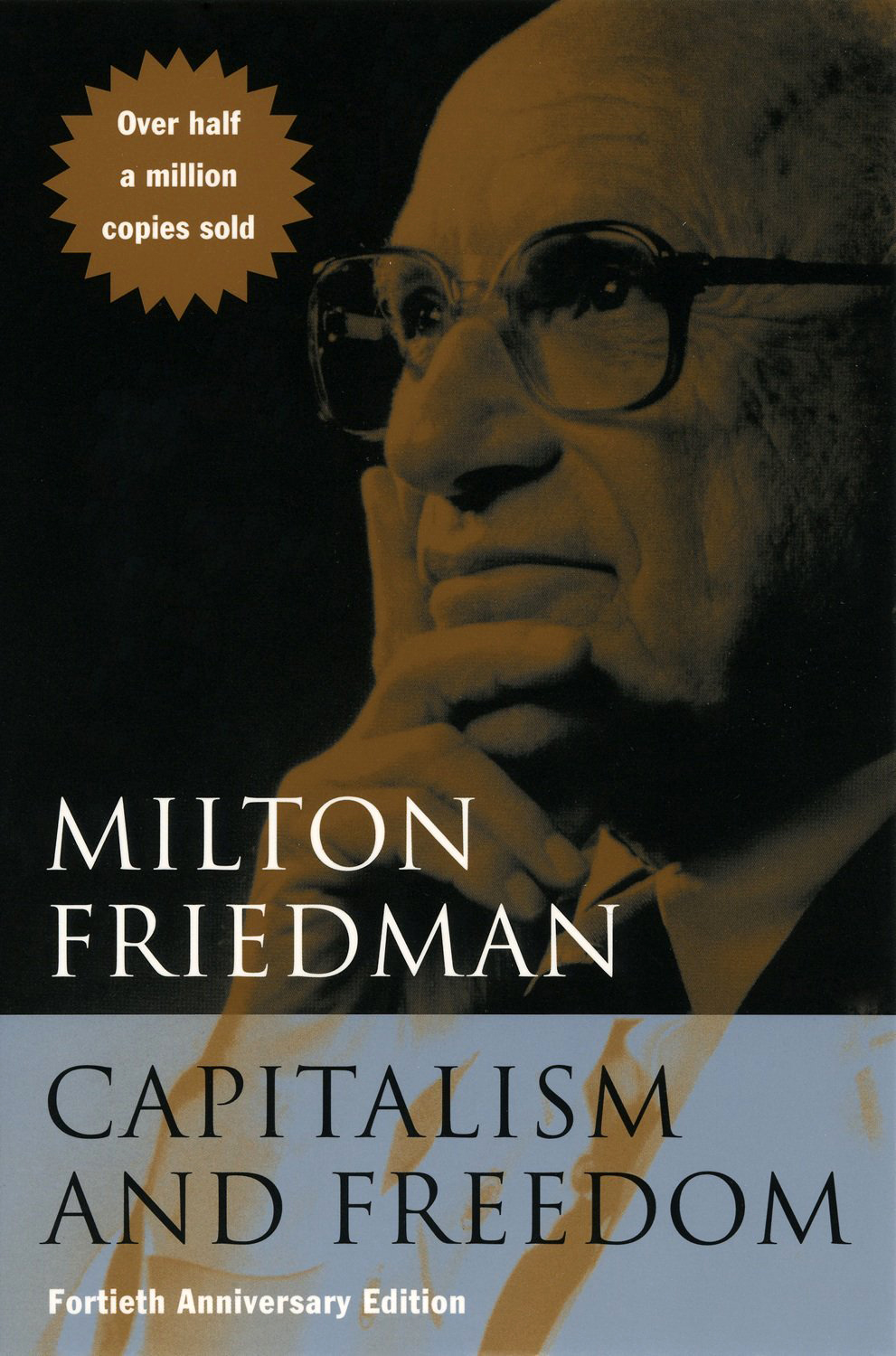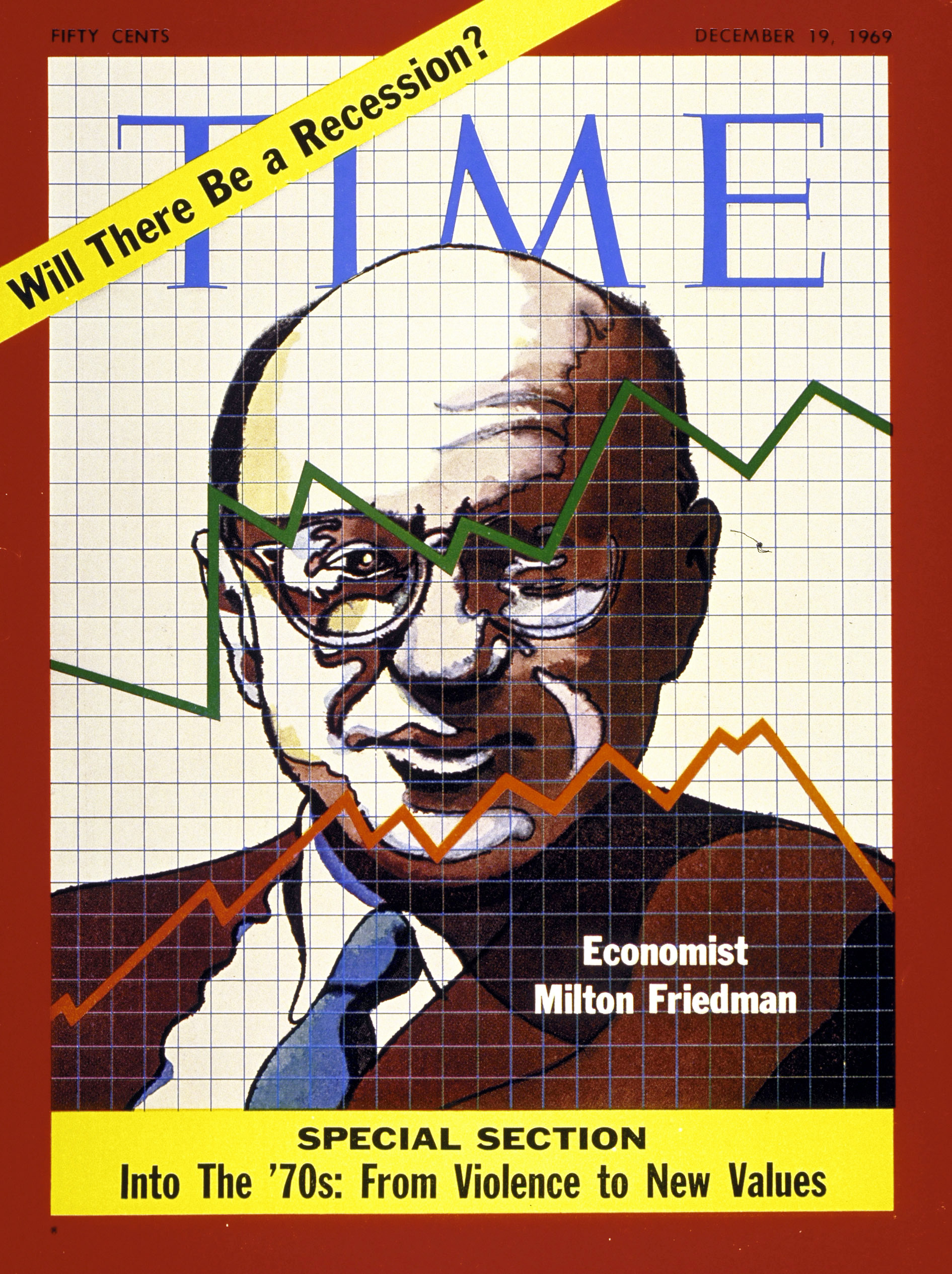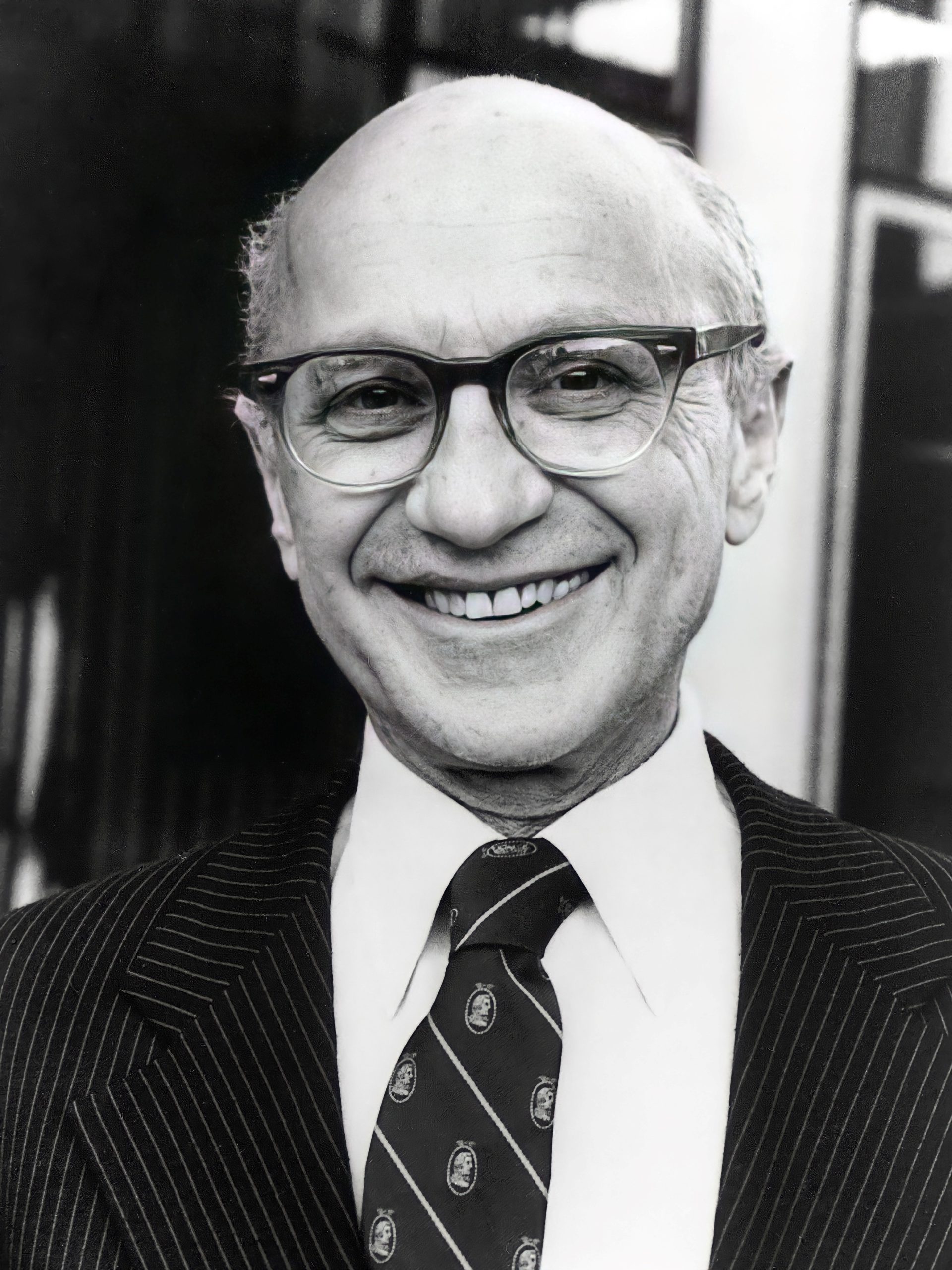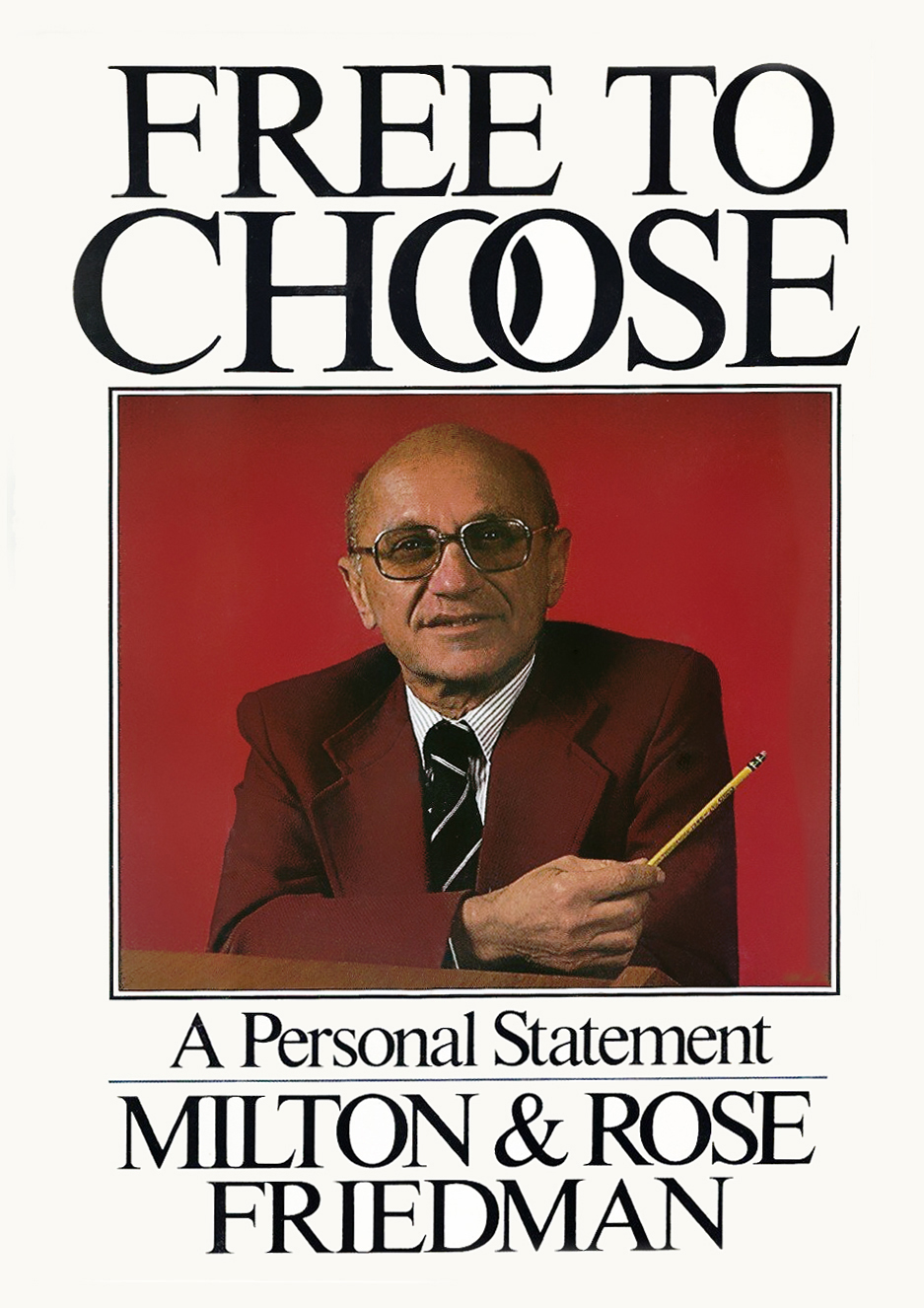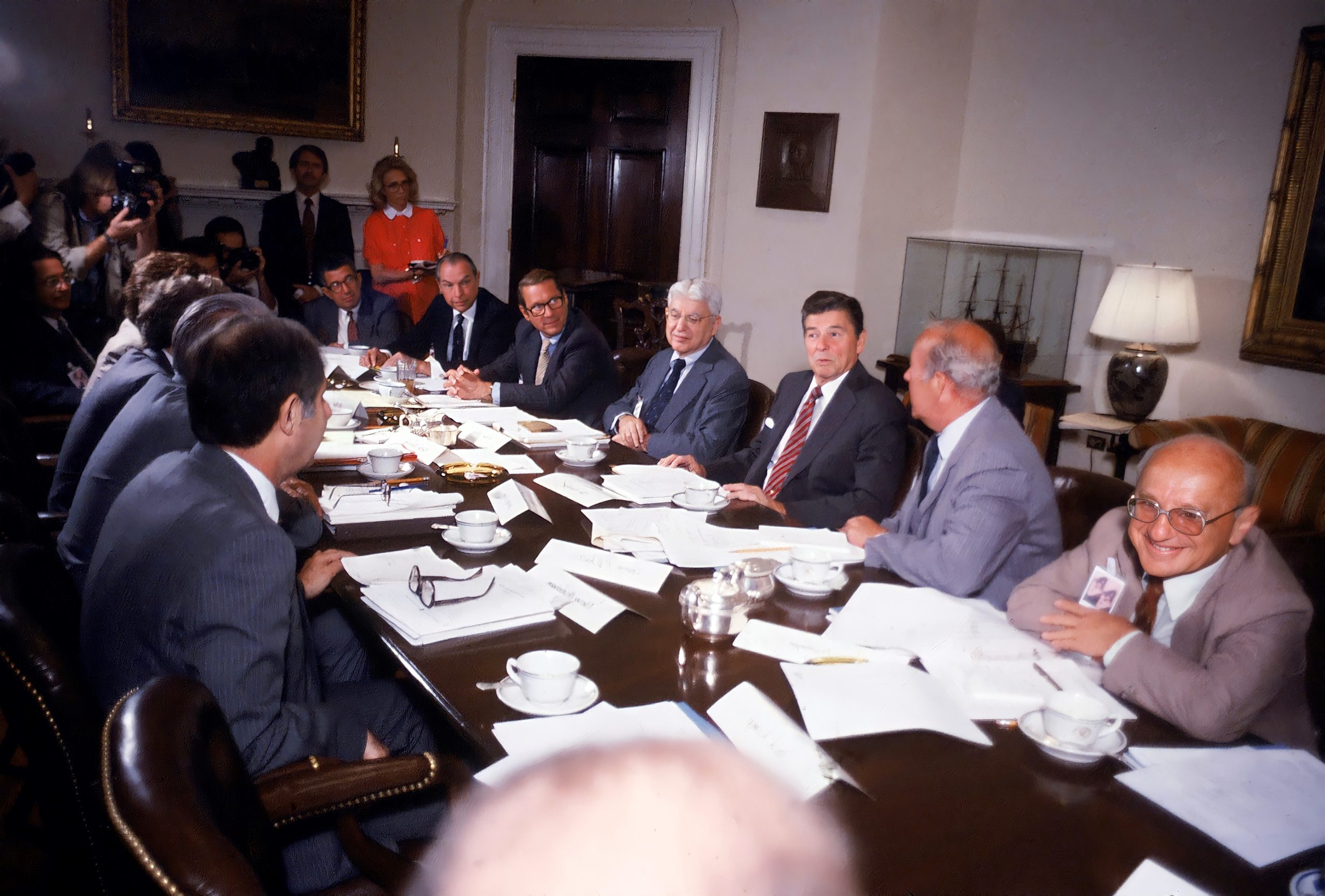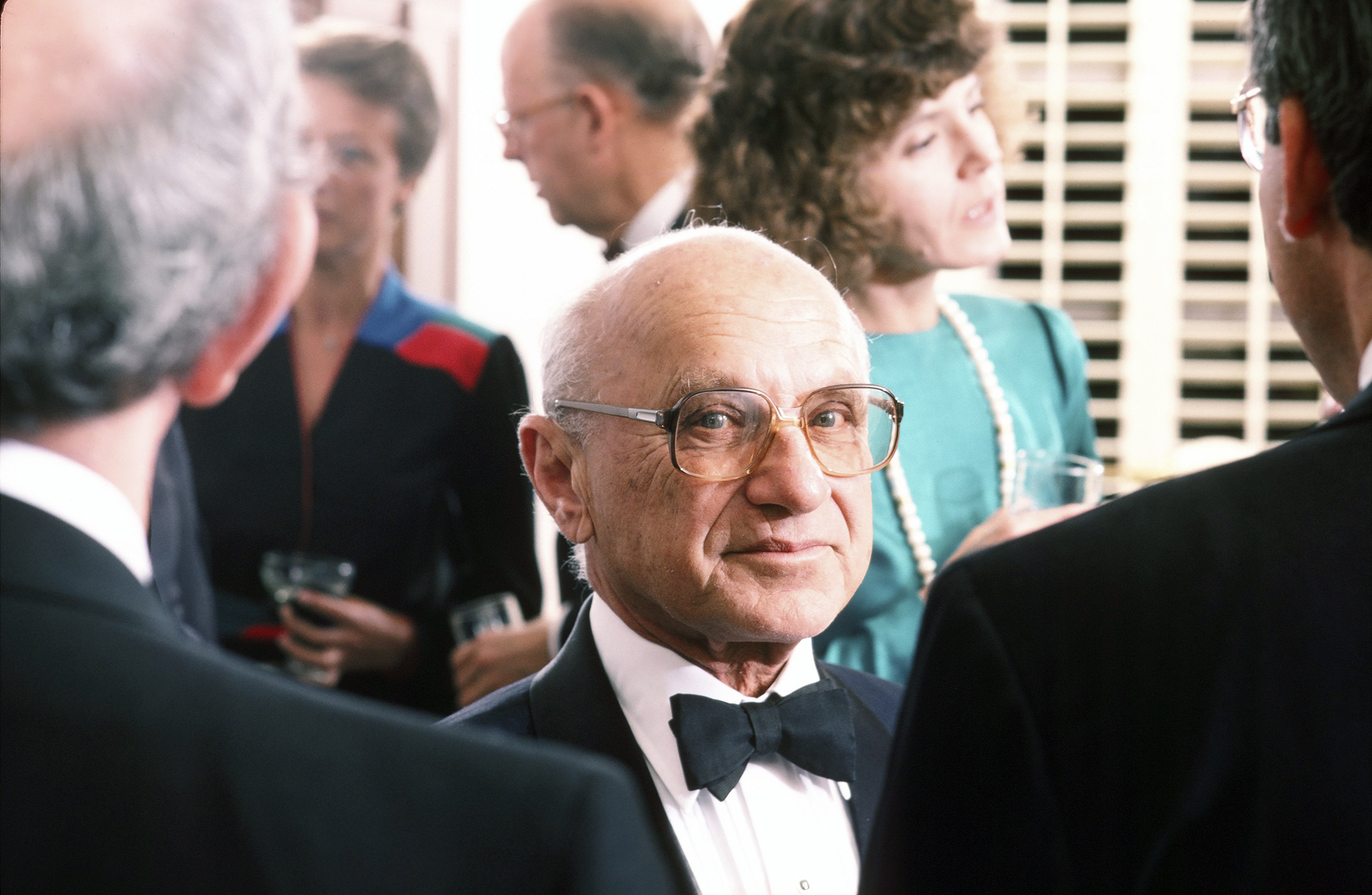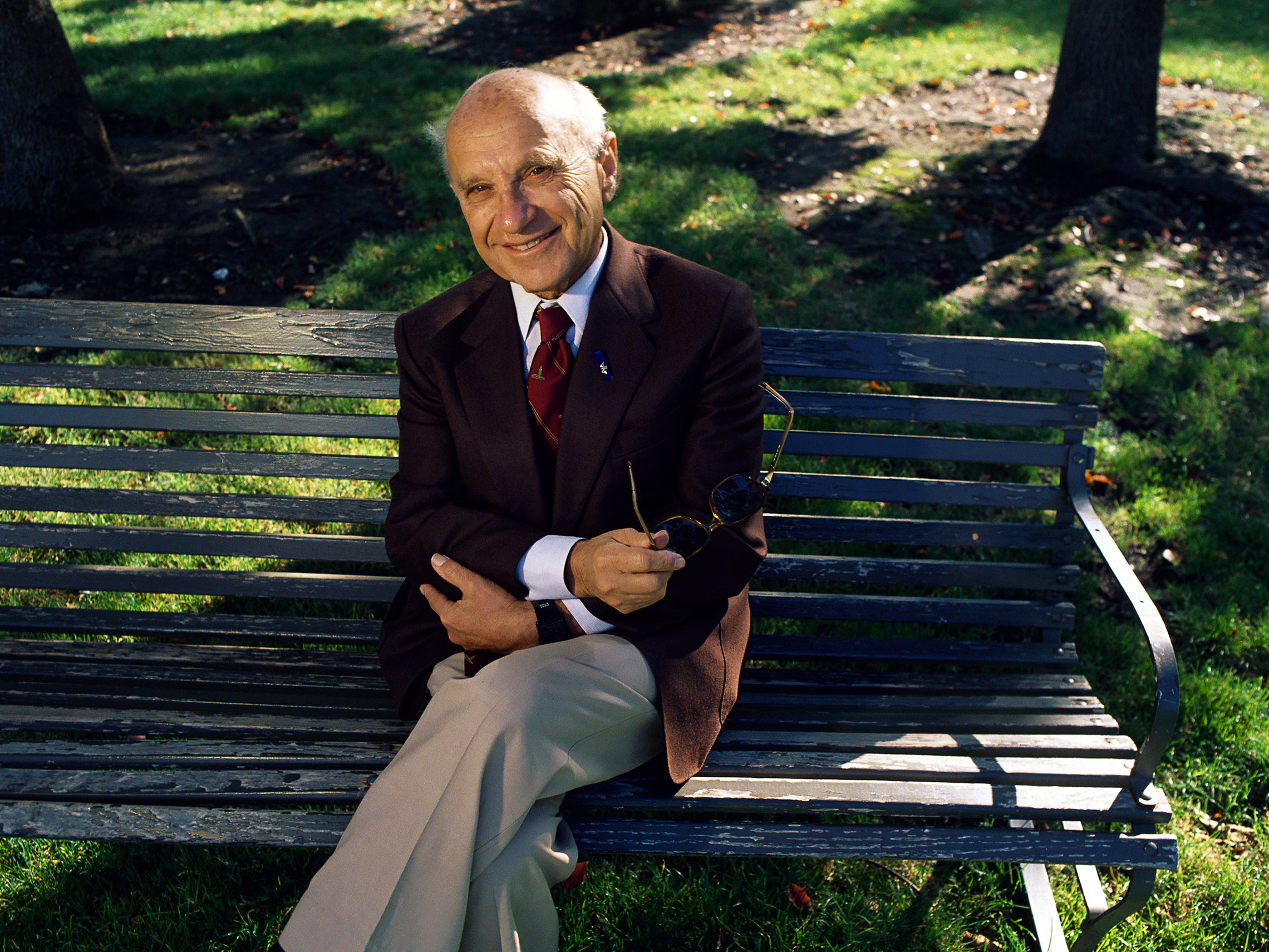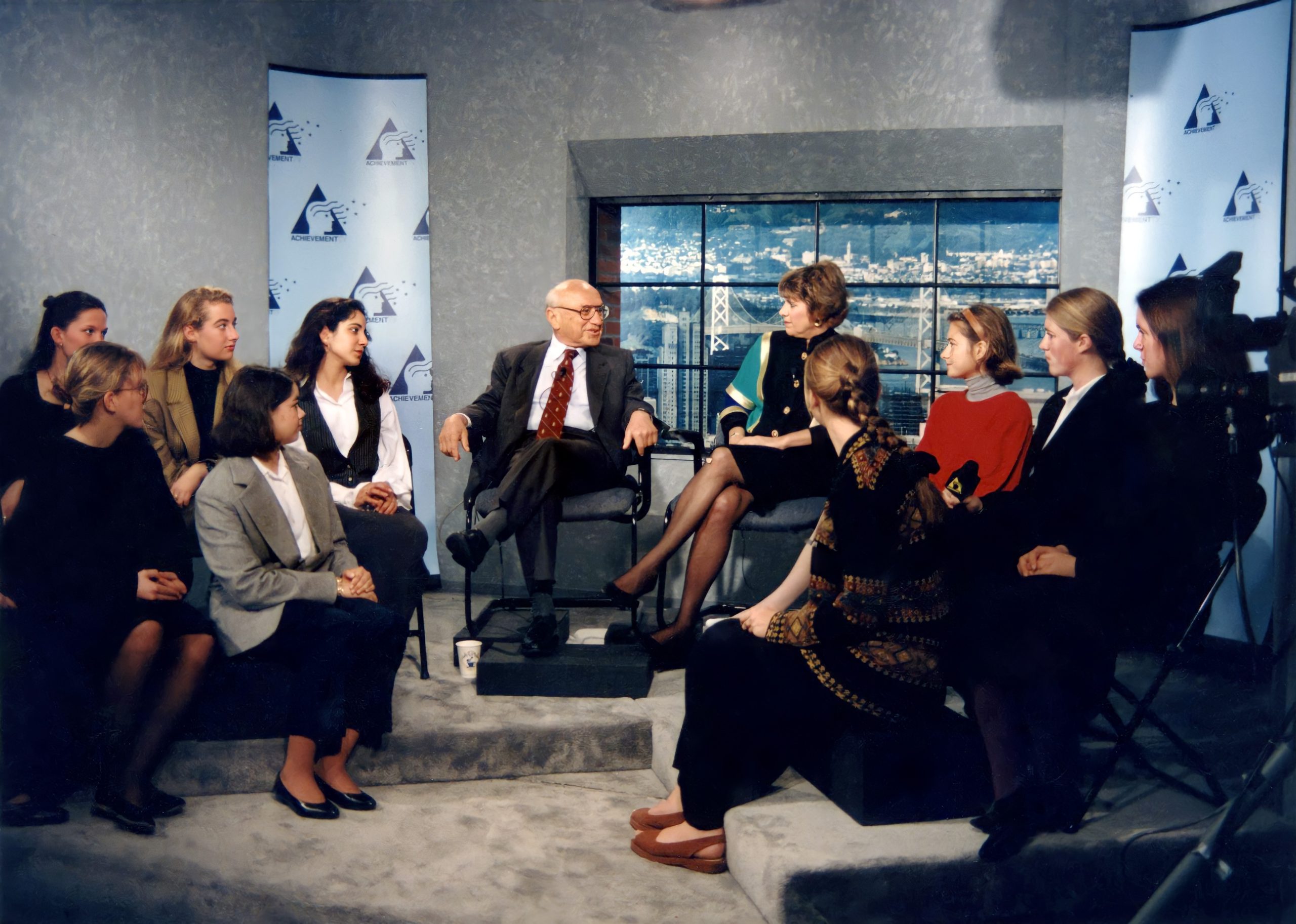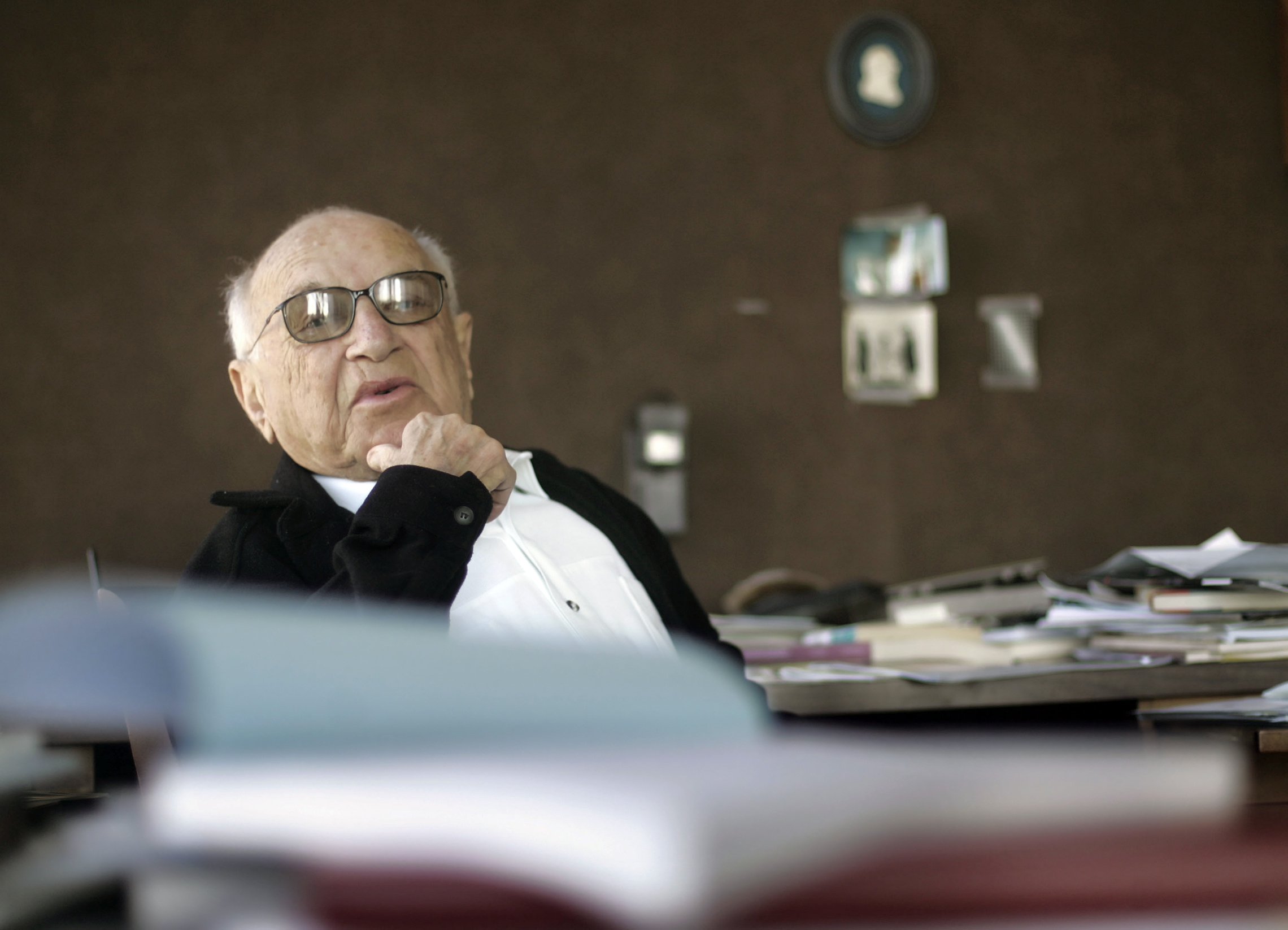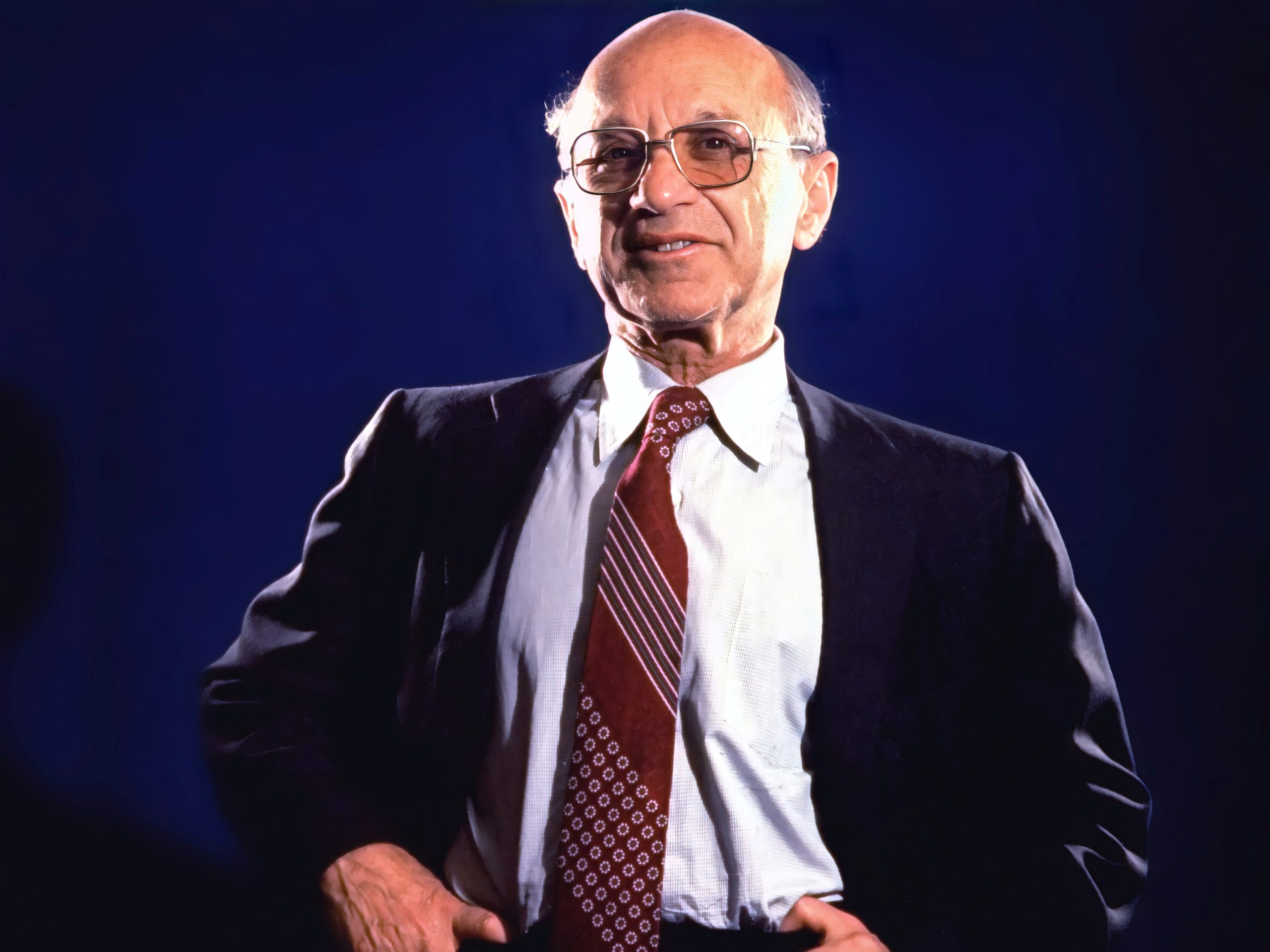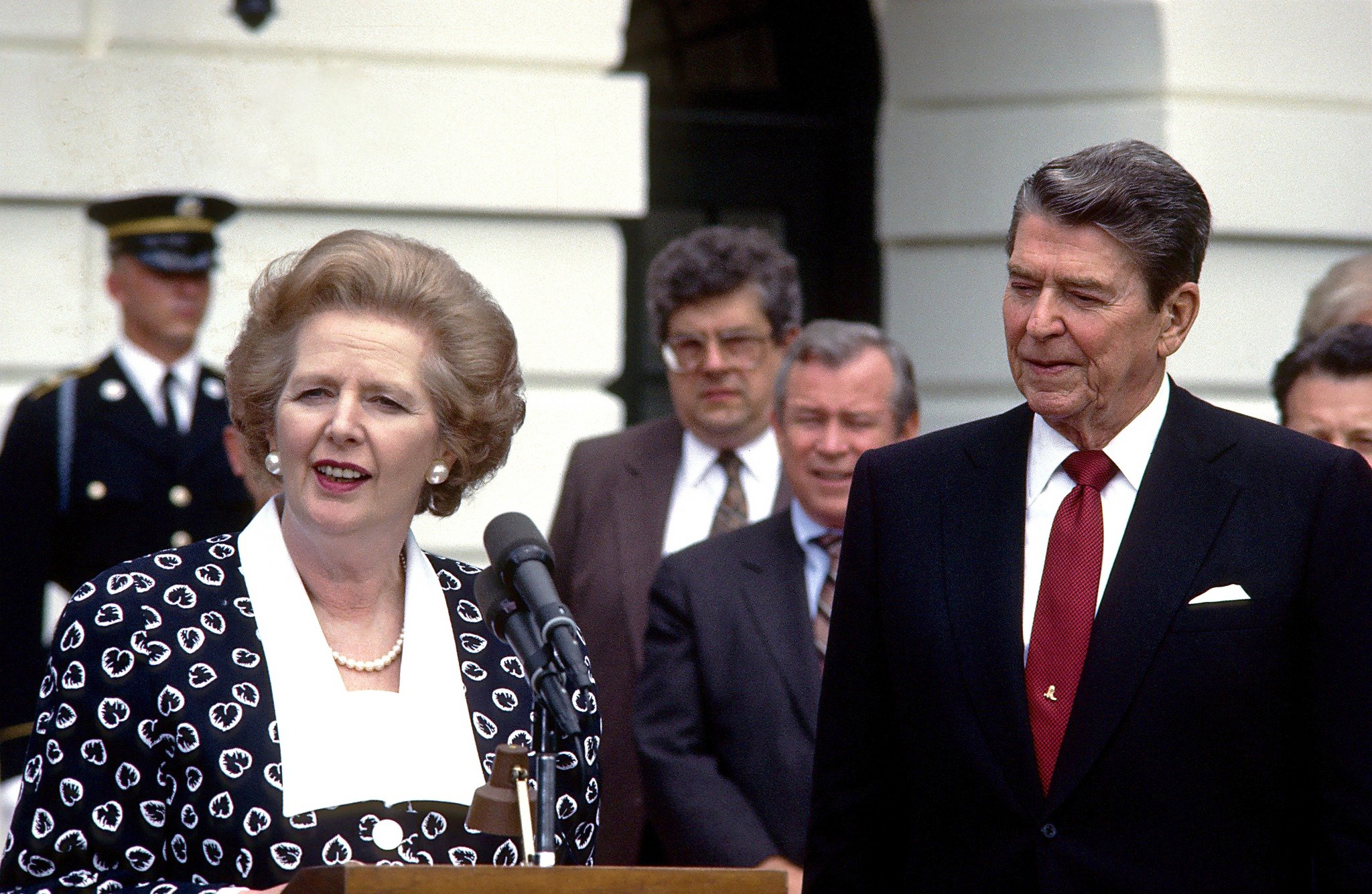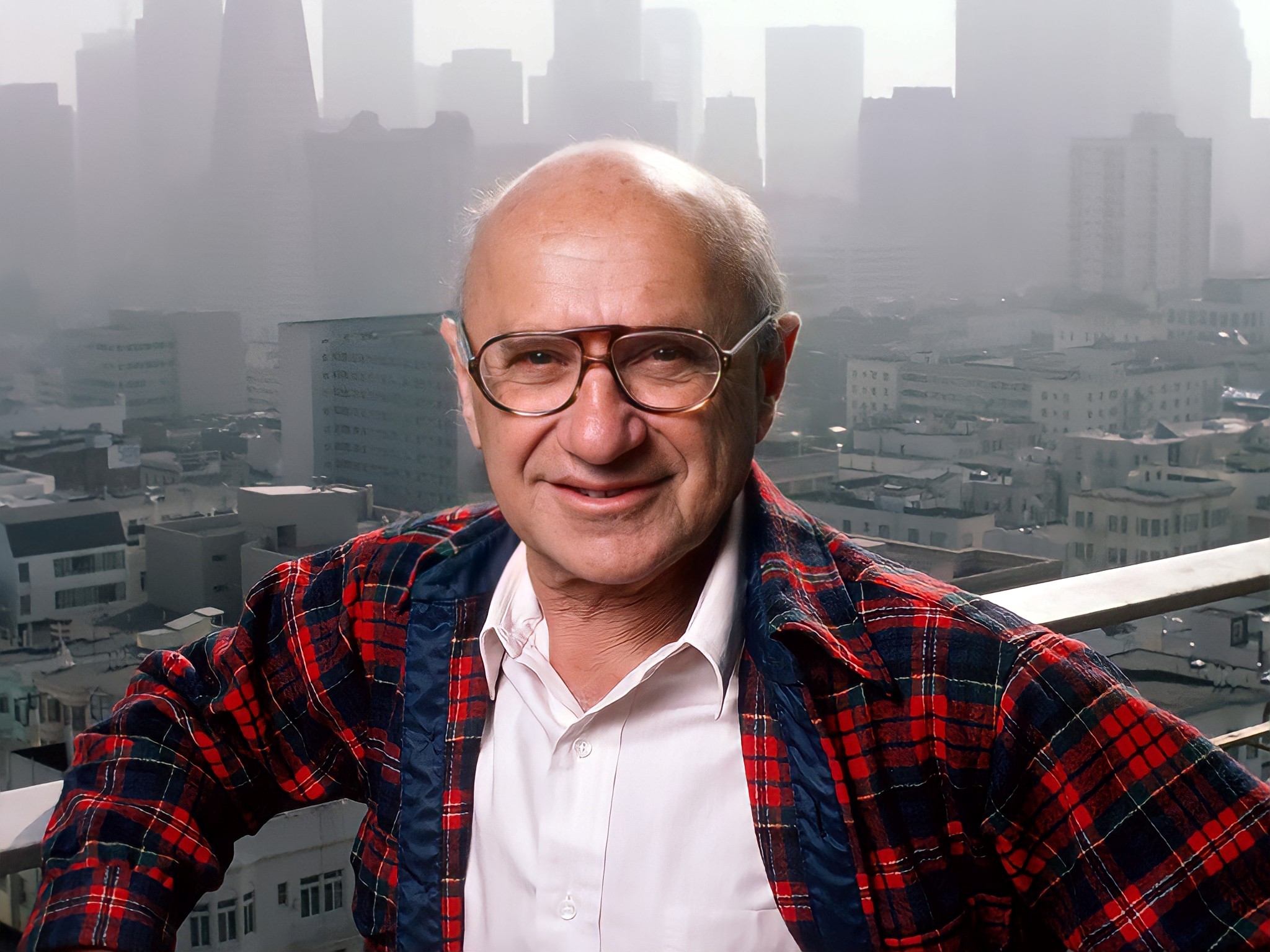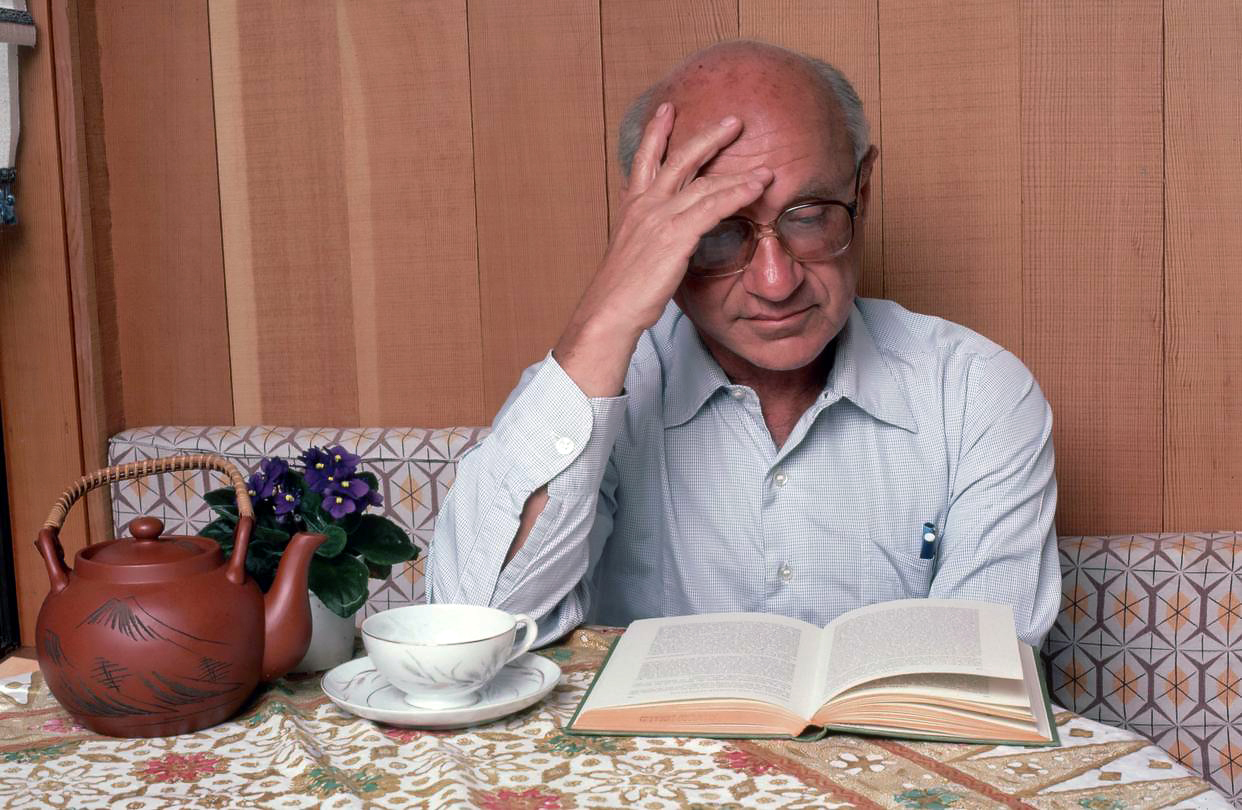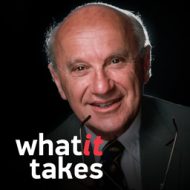Let’s delve a little bit into your early years. When did you first have a sense of what you wanted to do in your life?
Milton Friedman: It’s hard to know. I don’t think you ever have that sense. When I went off to college, I knew I liked mathematics, and I was pretty good in mathematics. I was an ignorant boy in a small town, in a family that had never had anybody that had gone to college. I didn’t know what you use mathematics for. The only thing that I could find out was that it was used in the insurance industry somehow. So I started to bone up on actuarial work, and I was going to become an actuary. Indeed, there is a thing called the actuarial fellows that you have to pass a series of examinations for in order to become a member. While I was an undergraduate, I took some of those examinations. They are about the hardest examinations in the world, as anybody will tell you, in mathematics, and I failed some and passed some. So that was my original intention. I just wanted to be able to make a living out of math. But then, when I got into college, I got started getting involved in economics as well as mathematics. It was also a propitious time.
I started college in 1928. And by 1930, when I was a sophomore, the economy had started to go into a decline. By 1931 and ’32 it was, of course, a precipitous decline. It became clear that an enormously important problem was what was going to happen to the economy. That seemed [to be] the most dominant thing. But yet, even when I was a senior, I wasn’t sure what I was going to do. Partly because I didn’t have any money, and I needed to get some help if I was going to go anywhere. As it happened, I applied for and received graduate scholarships. In those days, these weren’t fellowships. All this paid for was tuition. And I received two: one from the University of Chicago in economics, and one from Brown University, in mathematics. So I had to make up my mind at that point whether I was going to go in the direction of mathematics or in the direction of economics. What made up my mind for me, of course, was the state of the world. In 1932, with that choice before you, economics seemed most clearly and obviously the most important place where a young man should put his energies.
You thought that was the most compelling public issue?
Milton Friedman: No question. No question. Here was this great paradox. Millions of people out of work, millions of people hungry, and you couldn’t get the people that needed the goods and services together with the people who were in a position to produce it. When I faced up to that choice, I really didn’t have any doubt. If I hadn’t gotten a scholarship to Chicago, I would have had to go to Brown. I had worked my way through college. I had a tuition scholarship to Rutgers University when I was an undergraduate, but I earned all the rest of my expenses. Indeed, I graduated with a small kitty, but not enough to have paid even a year’s tuition, let alone several years. So I had to go where I could get the help. Fortunately, I got a scholarship at Chicago thanks to one of my teachers at Rutgers, who had been a University of Chicago student and was close to some of the faculty people there.
What did your parents think when you first told them that you were interested in mathematics, or when you started to become interested in economics?
Milton Friedman: That’s not as easy a question as you might think. My father died when I was 13 years old. My mother was a very intelligent, able woman, but she was not an intellectual. My father was not an intellectual, neither one of them had ever gone… well, as a matter of fact, I doubt that either one of them had ever gone through anything beyond elementary. They knew how to read and write. But, they were in small private business. We had a small retail store at the time that my mother ran, that was the source of our livelihood, and also was the source of enormous aggravation, because you were always owing more money than you had funds to pay with. I would say that by today’s standards, my parents in the whole of their life never had an income that came anywhere close to what we now regard as a poverty standard. But they did not regard themselves as poor. By no means whatsoever. And they weren’t.
In my opinion, the poverty level is a very uncertain and meaningless standard, but if you measured it by that, they never in their whole lives had an income that came anywhere close to the poverty level. And yet…
They never regarded themselves as poor, because they were self-sufficient. They might be in difficult economic straits, we never had any great luxuries or anything, but we always had enough to eat. We always were clothed so that we were not a scandal, or a shame on the community. None of us would have said we were poor. We certainly were not rich. Many a night, early in my life, I heard my mother and father stay up at night worrying about where they would get the money to pay the bills the next day. From time to time they would have to borrow from friends or relatives or something to meet the tab. From time to time they would what’s known as “kite checks”. That is, write checks for the future, if they didn’t have any money to pay on, but they expected to get the money by the time they came around. But at the same time, they were hard-working, independent people, who always made a living in the sense that I mention. But they were not intellectuals in any way. And it wouldn’t have occurred to them to comment on my interest in mathematics or economics, because that wouldn’t have been meaningful to them. That was not their realm of discourse.
Remember, I was a first-generation American. I think you will find this same experience in many families. I know it’s the same experience my wife and her family, her peers had. Their parents were enormously anxious for them to be educated and schooled. There is no doubt about that. My parents, insofar as they could, would have sacrificed anything to make it possible for me to go to college. My family had one great piece of good fortune during the Depression: my older sister, who worked for Western Union, the telegraph company. She was employed throughout the Depression. She was unmarried and lived at home, with the family, so they had a steady source of income. I was able to earn my own way throughout college, and as I say ended up with a little kitty. The only year I was really in trouble was my first year of graduate study at Chicago. Fortunately, I borrowed money from my mother and my sister that I was later able to repay. A hundred dollars or something like that, not a great amount.
My wife’s brother, who became a very important economist, Aaron Director, was himself an immigrant to this country. One of these remarkable stories, like Arthur Burns. Arthur Burns came over to the United States at the age of 12, I think, from Austria, not speaking a word of English of course. By the time he was 23, he had gone through elementary school, high school, graduated from college, and was a member of Phi Beta Kappa, and so on. The same thing with my brother-in-law, Aaron. He came at about the age of twelve, not speaking a word of English, and in ten years, he was a graduate of Yale. His mother would occasionally send him five or ten dollars, because that’s all she could scrape up, but the rest of it he had to earn on his own. And so did I.
This idea that’s present now, that somehow or other it is necessary to have great government subsidies to enable people to go to college is not true. At no time, and our own experience show it, has it been impossible for people who had the requisite desire and ambition, who are willing to work hard — at no time was it impossible for them to get through college. Scholarships for tuition, for paying the cost, those all are very helpful and I think are very desirable. But, I think our present arrangements under which we subsidize — so extensively — people on an across-the-board basis, without a question of merit or anything or a need, are very undesirable.
Anyway, that’s a separate question. But to go back to your question, people like me were of a new generation, and we were in a different world. It wasn’t our parents’ world. The world they had grown up in had been an altogether different world. So if I had said to my mother, “I’m going to be interested in mathematics,” she would have said “What’s that?” Let me emphasize, it was not because they were uninterested, or unwilling to make sacrifices. Not because they didn’t value intellectual activities very highly, but because they were not sophisticated.
But they were willing to support you in what you wanted to do?
Milton Friedman: Yes, whatever you wanted to do. Because they trusted your judgment in those areas far more than they did their own. My mother and father were both immigrants from Europe, but they had both come over as teenagers and met in this country, and it was a rather typical Jewish family. As you know, Jews have always valued intellectual activity very highly, and I was always very much interested in intellectual activity. That is, I was a voracious reader as a young man, and I did very well in school and so on. So it really never occurred to me that I was going to do anything else but go on to college if I could manage to get the money to do it.
You say you were a big reader. What kind of books did you like to read?
Milton Friedman: Every kind. Mostly fiction, of course. That’s what I think young people, young kids — shouldn’t say young people — children know, between 6 and 16 are inclined to read mostly is fiction, and I read all kinds of fiction. I had a small library, the Rahway Public Library, and I exhausted whatever they had on their shelves.
Was there one author or subject matter that just grabbed you?
Milton Friedman: There were quite a number of things that caught my attention. What really impressed me was a series of books by a western writer who wrote The Call of the Wild, Jack London. Jack London wrote a marvelous book called The Scarlet Plague, which I must say for some reason is the one book I remember best out of that period. The Scarlet Plague is a novel, and it has to do with an illness, the scarlet plague, that comes to the country. People die out all over the world, all over the United States, except for small isolated colonies that are left. Advanced civilization collapses, the buildings in New York are empty, and so on. Here is a boy who is suddenly growing up — in the wilderness of California as it happens — and he stumbles over a railroad track, which has by now been almost buried in the dirt. He asks his grandfather or his father about that, and then you hear the story about this plague that wiped out mankind, and how in isolated places they are gradually coming back. I don’t know why that one stuck in my mind so much, but it did.
Perhaps it came back to you during the Depression, when things seemed so bleak.
Milton Friedman: I think that’s very likely the case. At the time I read it, it would have been in the ’20s, when there was not that kind of thing going on. I also read all of the Rover Boys books, and all the other books of the time. I read almost anything that I could get my hands on.
Was it just a natural curiosity, or was there something that had to do with stimulating your imagination?
Milton Friedman: At this stage I couldn’t answer that question. All I know is, I enjoyed reading.
What experience or event inspired you most as a young man?
Milton Friedman: That’s a very hard thing to say, especially when you say “inspired.” If you ask what events I can look back on as defining events, there were several of them. One of them was an early conflict over religious beliefs. Internally, not externally.
My parents were Orthodox Jews, but they weren’t fanatic about it. They observed the dietary laws and so on, but there was nothing fanatical about it. They weren’t, but I was. In my early years, I was fanatic about it. If this was right, this was the religion, you should do what you had to do, and so I was scrupulous, at about the age of 11 or 12, maybe 13. Not quite 13, I guess. Ten, 11 or 12. I was an enormously observant Jew. I remember once going on a joint Boy Scout trip, a trip with a number of Boy Scout troops, in which they were going to have hot dogs for lunch. They were not Kosher hot dogs, so I ran away, because I didn’t have the courage to stand up and say I wasn’t going to eat them. That was a defect in my character, and I simply ran away. But then, somehow or another, and I don’t know where, I began to question it. When I finally decided that there was no fundamental basis for it, that all of this was mostly myths and prejudice, then I went the other way. My wife will tell you that I became fanatically anti-religious.
So that was one set of defining events, which certainly had a very great impact on me. There was a very different set at another time, that I can tell you very quickly.
I had a teacher in high school who was really somehow — I think he taught government or political science, something like that, whatever you call it in high school — but he also taught Euclidian geometry, plane geometry, simply because he liked it as such a beautiful, intellectual discipline. And I took his course, and one point or another, he got rhapsodizing about the beauty of geometry, and he quoted the last lines of Keats’s “Ode on a Grecian Urn.” “Truth is beauty, beauty is truth. That is all you know, and all you need to know.” And those two lines stuck with me. I was about, probably 12 or 13 at the time. And they have stuck with me ever since, because they so much reflected the sort of feeling I had about geometry as well, and about mathematics in general, that its appeal is one of beauty, kind of an intellectual purity and beauty. And now, I’m sure that was what drove me into the direction of thinking I wanted to make mathematics my lifetime work.
Perhaps there’s a connection between the two stories you just told. A skepticism for wisdom that is handed down and presented to you, and the notion that truth is beauty. Is that the same skepticism you have applied to various governmental policies and approaches over the years?
Milton Friedman: Yes and no. I have not applied skepticism to those policies. I hope and I believe that I have tried to examine what their actual effects have been as opposed to what their intentions were. I think the great problem in so many of these areas is to distinguish between rhetoric and substance. There is a famous saying, “The road to hell is paved with good intentions.” And that is the case.
Almost all government programs are started with good intentions, but when you look at what they actually achieve, there is a general rule. Almost every such program has results that are the opposite of the intentions of the well-meaning people who originally backed it. I say “well-meaning,” because in every such case, there are people who are doing it because they believe it would be good for the country. Unless you have some people like that, it is hard to get anything through. On the other hand, it’s also hard to get through, unless there is an accord of people, who can see how they personally can benefit from having that policy put into effect. And in some cases, the results — not in all — but in some cases, the results do coincide with their expectations. But, they are almost always the opposite of the intentions of the well-meaning people.
Now, I don’t believe that’s a general skepticism about everything. I think that’s the old American saying, “I’m from Missouri. Show me.” I don’t want to go ahead on promises. You want to look at what actually happened. So I believe that the attitude has been a combination of the real training that I got in the field of economics, and the attitude towards economics as a concern with real problems, and as a machine with which to examine them. The real effects of real policies, and the desire to see what actually happened, as opposed to what people say will happen.
You mentioned a teacher who inspired you. Are there other people that you remember from your youth who had a comparable influence?
Milton Friedman: There was this one man I mentioned who taught plane geometry, and there were a number of other high school teachers. One who taught Latin, as a matter of fact, which I never became very expert in, but I did take it. He happened to be a very young man, only just recently graduated from college, and who for that reason was closer to the high school students under him. Somehow or other, I think he had a real influence on me, encouraging me to go ahead, try to go on to college, to become more educated and more trained. Those are about the only people that I can really think of before I went on to college. Once I went on to college, there were some other people who had some great and very real influence on me.
Who sticks out in your mind during that period?
Milton Friedman: Oh, there is no doubt about that. During my undergraduate college, there are two people who unquestionably had a major influence on me. One of them was Arthur Burns, who later on became a very important influence on the political area. He was Chairman of the Council of Economic Advisors under President Eisenhower; he was a close advisor of President Nixon. President Nixon appointed him Chairman of the Federal Reserve Board, and President Ford reappointed him. Subsequently, under President Reagan, he was Ambassador to Germany. My association with him was long before those times. He was a relatively young man when I was an undergraduate. In fact, he was just in the process of trying to complete his doctoral dissertation at Columbia. One of the most valuable courses I ever took in my life was a course I had with Arthur. I call him Arthur, because he later became a very close personal friend of mine. We were friends for all of his life; he died a few years ago. I gave a little talk at a memorial ceremony for Arthur after his death.
Outside of my parents and my wife, there is nobody else who had as much influence on my life as Arthur Burns did. And as I say, that major source of influence started exerting itself during a course I took in which there were only two students and he. And this course consisted — I don’t know what it was supposed to be — but it consisted in going over the draft of his doctoral dissertation sentence by sentence, and trying to find mistakes in it, and analyze it and improve it and criticize it. And as I say, I can think of but one other course in my life that had as much value to me as that course. Because it supplied standards of workmanship, the level of accuracy you want to aim at, the openness to criticism. Those are the kinds of things it provided.
Arthur was a great scholar. He only stayed at Rutgers for a few years, and then he became a professor at Columbia University. From Columbia University he was associated with a research organization called the National Bureau of Economic Research; he worked there with Wesley Mitchell. Wesley Mitchell was a very famous economist at the time, and he was head of the National Bureau before Arthur was. You read in the papers today about the leading indicators. Those leading indicators derived from the work of Arthur Burns and Wesley Mitchell at the National Bureau of Economic Research during the 1930s. Henry Morgenthau, when he was Secretary of the Treasury, asked Mitchell if he would develop some way of trying to forecast what was going to happen to the economy that they could use at the Treasury. And he and Arthur, mostly Arthur, produced this set of leading indicators. They produced the original set, which is the great-grandfather of the present set. So, Arthur certainly had an enormous influence.
The other person who had an enormous influence on me was the man who really was responsible for me going to Chicago, Homer Jones. He was a graduate student at Chicago who had taken a job as an instructor at Rutgers, because he needed the money. He had been working there for a couple of years. He was a relatively young man, but he had a very real influence on me because of his understanding of economic analysis, and also because of his qualities as a teacher and a human being. He was a great human being. Homer subsequently went to Washington to work with the Federal Deposit Insurance Corporation, and then he became the vice president of the Federal Reserve Bank of St. Louis. He really achieved a great deal of importance in the area of central banking and monetary policies. Homer had been a student of Frank H. Knight at the University of Chicago. Through Knight, he persuaded Chicago to offer me a tuition scholarship, and that’s how I happened to go to the University of Chicago. So those two people, unquestionably, had the greatest influence. There are other professors, other teachers who had an influence on me, but those two stand out.
A lot of people have brains, and potential, and work hard. Not everyone is as successful as you have been. How do you account for your success?
Milton Friedman: Luck. Chance. People grossly underestimate the role of luck and chance in people’s lives. Let me illustrate it. If the United States, in the 1880’s and 1890’s, had had the kind of laws it has now, my parents would never have been able to come to the United States. They would not have gotten visas; they would not have gotten in there. If they had met and gotten married where they came from an area, when they had left it was Hungary, Austria-Hungary. It was Carpatho-Ruthenia. Later it was at the tail eastern end of Czechoslovakia and is currently (1991) a province of Russia. If they had been unable to come to the United States, if they had stayed there and gotten married there, and I was born and all that, I’d now be a citizen of Russia. Pure chance. I had nothing to do with it. One point after another, pure chance. If Homer Jones hadn’t happened to be teaching at Rutgers at the time I went there, I never would have had the opportunity to go to Chicago. I would certainly not have become an economist. I would probably have become an applied mathematician. I don’t know what I would have done in that area. And so it goes. Pure chance plays an enormous role in the lives of all of us.
I don’t mean to say that everything is due to chance. Certainly it is not, certainly character matters. Certainly, whether people are willing to work hard. Certainly pure IQ matters. And that’s a matter of chance, too. Pure random chance, which half of which parent’s genes you happen to get. Character, intelligence and so on matter, but I think accident matters an enormous amount. Whether people happen to be at the right place at the right time.
But when all these fortunate things happened to you, later on in your life, you were prepared. You had spent enormous time and work preparing yourself to take advantage of whatever lucky breaks you had.
Milton Friedman: I think the most important single thing in people’s success is whether they are lucky enough to be able to earn their living at doing something that, if they could afford to, they would do without any pay. I think the most unlucky people in the world are those who have to earn their living by doing something in which they would not voluntarily work overtime.
Things that are a drudgery for them?
Milton Friedman: Right. Things that they dislike. Millions of people have to do that, they are the most unlucky people. The luckiest people are people like myself, who, by accident, are able to earn their living by doing something that if they could afford to, they would do without getting paid. If you don’t really want to work overtime at a job, you shouldn’t have that job.
Would that be your advice to young people or others, trying to start a business? Does that work in our profit system?
Milton Friedman: I’d like to make a very different point. I want to introduce a little bit of realism. You must realize that what we have is not a profit system; it’s a profit and loss system. The loss part is just as important as the profit part. What distinguishes the private system from a government socialist system is the loss part. If an entrepreneur’s project doesn’t work, he closes it down. If it had been a government project, it would have been expanded, because there is not the discipline of the profit and loss element. If you have a really good idea, it may work. But remember, you’re gambling. That’s what makes it exciting, and that’s what makes it important. What rules out the mistakes is the possibility of making a loss.
The road to success is often a winding one. There are always setbacks along the way. Have you had setbacks along your life, and what did you learn from it?
Milton Friedman: I’ve been very fortunate. I’ve had setbacks, but I’ve had no really major traumatic setbacks. I happened to graduate from college in 1932. I did a year of graduate work at Chicago from ’32 to ’33. And then again, this is pure accident, I got a fellowship at Columbia the next year, which was an enormous boon to me. I’d never seen so much money in my life. It was $1,500, of which $300 went for tuition. Out of the other $1,500 I paid back the debts I had accumulated the prior year. And at the end, I saw more Broadway shows that year than I ever had in my life, in one year because that was during the Depression, when you could go downtown, down to Gray’s Bookstore on Broadway, and pick up a ticket to the best show in town for 50 cents, because they were being sold cut-rate. I had enough money left at the end of the year to finance a real summer’s vacation, which I had never had before. I had usually worked in the summers, with a friend of mine up in Canada.
That was really pure luck. Why was it luck? It so happened there was a professor at the University of Chicago, Henry Schultz, a mathematical economist with whom I established a good relationship. He happened to have a good friend at Columbia, Harold Hotelling, who was also a mathematical economist, one of the great ones. Through Hotelling, he got me a fellowship at Columbia. The next year I went back to Chicago, worked for Henry Schultz as his research assistant, and then the New Deal came along, and while the New Deal was not good for the country in many ways, it was very good for me, because I was able to get a job in Washington at the National Resources Committee in Washington, doing work that I enjoyed very much. It was very much along the line of my own interstice and development. After that I was able to get a job at the National Bureau of Economic Research in New York.
People nowadays have the idea that when you get your Ph.D. degree, you go right straight through. You first study, and then you write your Ph.D., and then you get your Ph.D., and then you go out in the market. That’s only because of the changed financial arrangements. In my time, very few people wrote their Ph.D. in residence. When they got their courses through, and were able to afford to get that paid, they went out and got a job and while they were working, on their own spare time, they wrote a dissertation. That was my case, except that I was lucky enough so that I got a job at a research institution, the National Bureau of Economic Research, to work with Simon Kuznets, who was a great economist. He also received a Nobel Prize in Economics before he died. Simon was doing a study on the incomes of independent professional people, and I was hired to assist him on it. That ended up as a book published jointly by him and me, part of which became my dissertation.
I’ve left out of course the most important event of that period, which was getting married!
Perhaps the most traumatic event of that period of my life was the next year, 1940 to 1941. We went out to Wisconsin on a visiting arrangement for a year, the University of Wisconsin’s Department of Economics. I got embroiled in the center of an internal dispute. It really was quite a storm. There was a conflict. There was a business school that was trying to take over the economics department, and there was a dean of the arts and sciences who was trying to improve what he thought was a mediocre economics department. He offered me a tenured position at Wisconsin and I accepted it. But then, all hell broke loose. The people of the business school and some of the people in the economics department started to complain about how this arrogant dean was trying to force me down their throats, and I was just this young brash man from New York, and he was offering me a higher salary. I think it was all of — what was it — $2,600 a year? I think that was it. Maybe it was $3,000. It was that order of magnitude. He was offering me that, and that was higher than they were paying somebody else. So anyway, as I say, the real thing that was happening was a dispute between the economics department and the school of business. But I became the center of it, and it also involved elements of antisemitism. In Wisconsin, this was in 1940, when the war had started in Europe, but not here. Wisconsin, as you know, had a large German population and there were a number of people in the economics department who were very strong sympathizers with Germany. And as is not surprising, I was not, and I spoke it very openly, my belief that the United States ought to go to war on the side of the Allies. So at any rate, that got involved. When it got to that point, I quit. I asked the dean to withdraw my name from consideration and quit. Nonetheless, that was a very traumatic experience. I have since been involved in similar public disputes, but that was the earliest and the defining one, if I may say so, for me.
How did that make you feel, the criticism of you personally and also the antisemitism?
Milton Friedman: Well, I had been lucky. I had grown up in a small town in New Jersey, where there were about a hundred Jewish families, and I had never encountered any real anti-Semitism. When I went to Columbia there were Jewish fellow graduate students who became friends of mine. I was very much impressed that they were much more sensitive to that issue than I was. Again, because of the accident of the small town that I grew up in, I never really felt any antisemitism. As I say, I may have imposed things on myself because of my own religious beliefs, but I was never discriminated against that I could see in any way. I had that same experience in college. I never felt it at Chicago, I never felt it. The first time that I really became aware that this was a major problem was when I went to Columbia and met students who had grown up in New York, where a third of the population is Jewish, where this is a very serious and real issue. So I didn’t regard antisemitism as a key issue in the Wisconsin dispute, and it didn’t really affect me. It just happened to be one of the aspects of it that was very unpleasant. For the rest, it was my introduction to academic politics, and it was very valuable to me.
You know, there are no politics that are as dirty as academic politics, and the reason is very simple. If you fight over very little, the only pleasure in it is in the fight, and not in what you get. It’s really amazing. Consider any academic department, a department of anything. One of the members wins a lottery ticket for a million dollars. His fellow colleagues will come around, pat him on his back, tell him how lucky he is, and they will be envious, but there will be no malice it in. The same colleague, because he happens to get an offer from another university, or for whatever reason, gets a raise of $500 above the other people — all hell breaks loose. There is malice, and “That’s disgraceful! That’s terrible! That’s special treatment.” That’s academic politics. Because there is very little at stake. Therefore, people fight very hard about it when they fight about it. Academic politics can be as dirty as any politics in the world.
My introduction to that was the Wisconsin affair, and it taught me that I am going to stay clear of that kind of politics for the rest of my life. Fortunately, again just pure luck, I’ve never again been involved in anything of that nature.
Let me ask you about another area of fortune. Who has been the greatest influence in your personal life?
Milton Friedman: Undoubtedly, my parents to begin with, and undoubtedly, my wife, of course. We met at the University of Chicago as graduate students. She was studying economics, as I was. We both came to the same course. I mentioned earlier that there was one other course in my life that I thought had a similar influence as did Arthur Burns’s course, and that was this particular course. It was the first one I took in my first quarter at the University of Chicago, a course in pure economic theory under Jacob Viner, a great teacher. Rose, my wife, and I were both in that same class. Professor Viner, in order to get to know his students, seated them alphabetically. Her name began with D, and mine with F, so we were seated next to one another. See how luck plays a role? That was our first meeting, and we were married six years later. We’ve been married for 52 years since then, and there is no question that she has had the greatest personal influence on my life.
She has been not only your mate, but your editor, your collaborator, your co-author.
Milton Friedman: Right, and the mother of my children. We’ve had a wonderful life, both of us, I think. My wife would say the same thing if you were interviewing her. We have no regrets about that aspect of our life at all.
Do you ever get bored with your work?
Milton Friedman: Well, I haven’t yet! I hope I won’t. I think economics is a very fascinating subject. But I’m sure that if I had become a mathematician, I would have found that an equally absorbing subject.
I don’t really think I’ve ever gotten bored with my work. Now, of course, there are parts of it that you enjoy more than other parts. Some parts are a real drudgery, but you have to pay the drudgery. But the parts you really enjoy are the creative parts. What you pay for is when you (A) have to write it down — but you do have to write it down — and (B), when you edit and re-write and re-write and re-write. I think one of the defects in the work of most people is that they don’t do enough re-writing and editing.
Going back over those ideas and refining them?
Milton Friedman: That’s true, refine the ideas. Most important of all, making sure that they are stated correctly, exactly, and clearly.
Another experience that had a great influence on me involved a gentleman I’ve already mentioned, Wesley Mitchell. When I was working at the National Bureau of Economic Research with Simon Kuznets, we wrote jointly — I did most of the writing I guess on this particular thing — what was published as a bulletin about the preliminary results of our studies. We wrote a draft of it, and Mitchell, who was a director of research, and the head of the institution, read it. He came in and he said to me, he said, “You know, Simon came to this country as an adult.” He was born in Russia, he was educated, schooled in Russia, and he came here about when he was 18 or 20. I’ve forgotten. But then he went to college in the United States. “So,” he said, “there is some excuse for him not writing very good English. But you were born in this country, there is no excuse for you not writing well.” And he gave me holy hell for the sloppiness with which I had written it. He said, “People always say, ‘Oh, I know what I mean, but I can’t express it.'” And he said to me, correctly, “If you can’t express accurately what you mean, you don’t know what you mean.” I must say that episode has had a very big influence, a major influence on that aspect of my life. He was absolutely right.
He himself was a beautiful writer and speaker. If he spoke extemporaneously, the sentences would come out perfect. He would start on a long sentence and you’d think he wasn’t going to finish it properly, and he would. And it would be eloquent, good English. It’s a rare gift. I’ve known very few other people who have it.
When you are editing and making those ideas clear, and making sure you are saying what you mean, what do you do to keep fresh? Do you have hobbies?
Milton Friedman: It’s not only for those periods. My hobbies are very clear. I play tennis. I ski. That’s not a full-time hobby obviously. That only happens sporadically. I didn’t begin that until I was age 40. And I walk. Of course, those are the physical hobbies, because I think as you get older, you have to be more and more certain that you carry on the physical activities, a rather disciplined kind. Outside of that, I would say my major hobby has always been widespread reading. My wife is an avid gardener, and I occasionally serve as a laborer on her behalf. And I am kind of an amateur carpenter. I have a workshop and work with wood, and I build things and so on.
I would think that having spent your whole life working with ideas, that there would be some satisfaction in actually creating something you can hold in your hand and look at.
Milton Friedman: Oh, there is no doubt about that. There is a great deal of satisfaction in sitting on a couch which you made.
Have you made your own couch?
Milton Friedman: Yes. I’ve mentioned my wife’s brother. We have always been close to him and he also has had a great influence on me. Aaron is now very old, he is ten years older than I am, but he is still fortunately alive. Aaron was really a very good cabinet maker. So he and I, and a third person in Chicago, together, tried to make a whole bunch of walnut couches. Lawn couches that are really beautiful objects and very comfortable, very nice. There is great satisfaction in sitting on them. I’ve made lots of other things on my own of course also, but I think you are right. You need something concrete to balance the abstract.
Your whole life has been spent in expressing abstract ideas, and in arguing actively on behalf of certain ideas.
Milton Friedman: That’s right. Well, I’ve really had a schizophrenic kind of a life. One part of my life has been purely — what I would call relatively purely — scientific, positive, non-ideological, concerned with trying to understand how the world works. And another part of my activity, which began fairly late, so far as my career is concerned, has been trying to influence public policy. That’s been ideological, concerned not simply with abstract ideas, but also with values. It’s a certain part of my life which has received more public attention. If you ask people about me, probably more people would know about that aspect of my life. But it has been sort of — you asked my hobby, that’s sort of been a hobby of mine as it were, an avocation. My real vocation has been scientific economics, positive economics.
People get a great misconception about economics. They think, “What the devil! If there are two economists in the room, there are three ideas.” That’s wrong. On the great bulk of issues, most economists agree. But you don’t talk about things you agree on. What gets into the press, what’s newsworthy, are the disagreements, and not the agreements. Where are the disagreements? On those parts of the discipline that are least well developed and that you know least about. You find exactly the same thing in other disciplines. Here is physics. People think of it as a pure, hard, scientific discipline. But when it comes to issues where values enter in very much, such as, “Do you want to have SDI (Strategic Defense Initiative)?” for example, or not, you don’t have the physicists speaking with a single voice. They are divided into camps and into groups. It’s not different.
In all disciplines, whenever values enter in, something different happens. But if you stick to the scientific part of the discipline, there is an enormous amount of agreement among economists. I have often met young people who became very much interested in economics who have wanted to devote their life to promoting what they thought were the right policies, and I have always advised them, “Look, that is all right as an application, but don’t do that as your vocation. You get to do something and earn your living on something that you enjoy doing, but which is non-ideological and non-policy oriented, and then do the rest as a sideline, because if you once start going along the other line, sooner or later, you’re going to lose your sense of objectivity. You’re going to become kind of a fanatic, a pure ideologue. You are not going to have this balance to it, which you want to have if you want to keep yourself an open minded person.”
So you’re saying that one must be wary of making a career out of ideology because you become all values and no facts.
Milton Friedman: That’s right. Partly [it’s] that and partly it is very much dependent on the kind of sources of income that you don’t want to become dependent on, because you will find you have special rituals of courtship as long as your ideological preconception meets their special interests. But, they won’t have anything to do with you, if it doesn’t.
And therefore, if you try to make your living that way, you will always have to come up against the situation where you have to decide whether you’re going to sacrifice your principles in order to be able to get the money you need in order to achieve something else. That is to say, well, maybe I’ll bend a little in this direction because that way I’ll be able to push my other idea.
It’s not a healthy way, it’s not a good life. In my opinion, if you work, if you get some kind of a solid base, I don’t care whether it’s — I’m going to say it should be intellectual — go into business, but get yourself an independent base so that you can really be truly consistent and stick to your principles so you don’t have to modify them in order to satisfy somebody else.
People don’t realize how hard it is to have truly free speech. Very few people in the United States are in a position where they can express what they really believe freely and without inhibition.
No head of businesses, almost no head of a business, very few, because if one way or another the ideas that they express are going to offend some source of income for their firm, they’re in trouble. I can give you some very simple examples.
During the 1950s, ’40s and since, the U.S. has been issuing savings bonds. There’s been a great deal of propaganda to buy savings bond. For much of that period though, that was the biggest bucket shop operation in history, because the government was issuing savings bonds, which when they were redeemed, would enable you to buy less than the initial price when you purchased. You paid $100.00 for a savings bond and got 3 or 4 percent interest, but the inflation rate was 5 or 6 or 7 percent. When you got back $125.00, $150.00 at the end of the period, it would buy less than the $100.00 did at the beginning. You were paying for the privilege of saving. It was a bucket shop operation. It was a disgraceful operation, I think. And it should never have been engaged in.
During much of that period every bank in the United States in sending your monthly statement to its depositor would include a brochure advertising the virtues of saving bonds as a way of saving for your future.
I have talked — at that time I talked to many bankers, and I said, “Tell me, do you buy savings bonds for yourself?” Of course not. “Do you really consider them a good investment?” No, they’re a terrible investment. “Why do you put these brochures in your slip?” Because the Treasury wouldn’t like it if we didn’t.
Again, they formed committees, a savings bond committee that had big advertisements in the paper with pictures and all of these great people on it advising people to buy savings bonds. Nine out of 10 of those people knew that they were giving very bad advice. And they were all doing it because it was very important for them to be in the good graces of the Treasury or whoever else.
Now let me give you a very different example.
I would just add one thing there. This was not always in wartime?
Milton Friedman: Oh no, not in wartime at all. In peacetime. Let me give you a very different example, and it wasn’t at wartime at all. We’re heading towards socialized medicine. You’re a professor at a medical school. Your medical school is receiving two-thirds of its income from the U.S. government. You believe that you ought to have strictly private medicine.
Would it be easy for you to get up and say that?
Not at all. It would be very, very difficult. I’ve often said that the only people who have real, honest-to-God freedom of speech are tenured professors on the verge of retirement or who have already retired and have an independent income like myself. But I think one of the most precious things in life is to be able to say what you believe freely and openly without having to worry too much about the consequences—I say too much.
I don’t believe that it ought to cost less. If you’re going to say unpopular things and you’re going to become unpopular as a result, that’s going to impose a cost. And sometimes maybe you won’t be willing to bear it. But, there ought to be no so-to-speak artificial costs, artificial limitations on you. But yet, there are on most people.
I can give one example after another of the same kind of thing. Right, you have this terrible situation that’s happening in college after college in this country of a complete intolerance for speech, which is not, quote, “politically correct.” It’s come to be a new term that’s used, “politically-correct speech.” It’s a terrible term. It’s a disgraceful term.
Correct speech ought to be speech which expresses what a person believes, what he thinks to be the truth. And it’s a disgrace that in universities, of all places, there should be the kind of censorship that is in fact being imposed.
Even if that speech expresses racial or ethnic hatred?
Milton Friedman: Absolutely. Now again, I don’t blame people for being angry at such speech. And if you’re going to express it, you ought to be willing to bear that kind of anger, absolutely.
But you shouldn’t be prevented from expressing it?
Milton Friedman: You shouldn’t be prevented from expressing it. What’s important is not only freedom to speak but freedom to listen. I don’t think the freedom to speak includes being subsidized by anybody. I don’t believe it includes freedom to use government facilities like a hall to give a speech.
What it includes is, on the one hand, the right to hire a hall, say what you want, and second, and most important — not for the speaker, but for everybody else — the right of everybody else to listen, to hear what they want to hear.
And what’s happening now is not so much restriction on freedom of speech, but a restriction on freedom to listen. If a professor says something in a course that other people don’t like, they come in and disrupt the course so that nobody can listen to them. The people who want to hear them can’t hear them. And I think that’s absolutely disgraceful.
In fact, I think the most important single virtue, human virtue, is tolerance. And tolerance grows out of humility. If you really know the answers, if you really believe that you have the truth, THE truth, the ultimate truth, how can you tolerate it? How could you let anybody sin if you really know what sinning is? Can you let them sin? No. So the source of tolerance is the recognition that none of us has the truth.
We may have very strong feelings. We may have very strong beliefs, but we always have to recognize the possibility — I like to quote a statement that Oliver Cromwell made, which he didn’t believe, but he states it very well even though he doesn’t believe it: “Now the bowels of Christ,” he said, “I beseech you, we think you may be mistaken.”
And that’s what’s important. Each of us has to believe, I’m pretty damn sure I’m right, pretty sure I’m right. But there is a chance that I may be wrong because the other fellow also thinks he’s right. And who am I say that some how or other the views he holds are less good than the views I hold?
So I want to be free to try to persuade him of my view. He ought to be free to persuade me of his view. But neither of us have the right to coerce the other through physical intimidation.
Or as Uncle Remus put it, “It’s not what you don’t know that hurts you, it’s what you know for sure that ain’t so.”
Milton Friedman: That’s right. Very good. There are many other sources of that saying. My favorite one has been a 19th century humorist — a very famous one — his name will come to me. (Finley Peter Dunne, creator of “Mr. Dooley”) He’s the one who said that “the Supreme Court follows the election returns.” He wrote in an Irish brogue. And he made exactly that statement. “It ain’t ignorance that’s the problem, it’s what we know that ain’t so.”
You’re known for a laissez-faire philosophy towards government intervention in the economy. Do you think if Congress gets its hands off, business will be able to operate more freely and more profitably?
Milton Friedman: First of all, the aim is not to have business operate more profitably. The aim of our society is to have people better off. Profits are a means, not an end. In a good society, it’s very hard to make profits, because you’ve got a lot of competition, you’ve got a lot of people trying to participate. We do. But as far as Congress is concerned, at the moment (1991) we are roughly 50 percent socialist. Government spending at all levels is now 43 percent of the national income. In addition, the government imposes regulations and rules on business that clearly take up another 10 percent or so of our income. So more than 50 percent of our resources are now being distributed and allocated by government. The best thing government could do, in my opinion, in order to promote the well-being of the consumers — which indeed would give more opportunity for entrepreneurs to get into business and to open up new businesses — the best thing government could do would be to cut its size. We have a great deal of downsizing by enterprises now, what we really need is downsizing by government. One more point: if you look at our real social problems — not our economic problems, but our social problems — almost all of them have been produced by government. One of our major problems, which has been mentioned, is that our school system is unsatisfactory. Why? Because in the main, it’s a government monopoly. The private schools, on the whole, do a very much better job than government schools. Just as socialism in general does a poorer job than private enterprise.
Why is that? People who advocate new public programs start out with great intentions, don’t they? What do you think goes sour in the process of carrying them out?
Milton Friedman: What goes bad is that nobody spends somebody else’s money as carefully as he spends his own. That’s fundamentally what goes bad. It isn’t that people are bad. The same people, on the one hand, spending their own money, and on the other hand, spending somebody else’s money, will behave very differently. What goes bad is that — people are sincere. The people who run the school system want to do a good job, they aren’t bad people. It’s not that at all — but they have no competition. They don’t have to prove themselves. And therefore, they tend to stress their own errors. In the case of the school system, a major problem is the extent of influence of the teacher’s unions. The National Education Association is the largest pressure group in the country. It has an annual income of $750 million, and it doesn’t hesitate to spend that to try to promote its own interests. In fact, it’s perfectly open and above-board that its purpose is not to promote education, its purpose is to promote the well-being of its members. And I don’t blame them for that, that’s what they’re there for. But if you ask what goes wrong, in my opinion, that’s what goes wrong.
Most people are receptive to the free-market argument as it applies to most goods and services, but when it comes to something like healthcare, they may argue that free-market principles don’t really apply. Do you think that there are areas like healthcare where we may need more government action rather than less?
Milton Friedman: I differ completely with them on healthcare. Free-market principles apply. The reason we have a healthcare crisis is because we’re not following free-market principles. Why in the world should you buy your health at the company store? The company store is an old anachronism which people try to avoid. The only reason we get our health through our employers is because there’s a tax gimmick under which, if the employer pays for it, the employee doesn’t have to pay tax on it. Whereas, if he pays for it himself, it has to come out of after-tax income.
The basic free-market principle is that an individual spends his own money and decides what he wants to buy. That’s not the free-market principle you now have in health. People aren’t spending their own money, the employer is spending it. What I think would be a major step toward a free-market system would be the so-called medi-save accounts, whereby you’d retain this tax gimmick, but have the employer put the money in an account in an individual’s own name and he or she would be responsible himself for purchasing his medical care. And then that would enable free-market principles to work.
We’ve had socialized medicine in Germany, in Sweden, in Britain, in Canada. All of these countries are having difficulty with it. There’s not one of them that doesn’t have long waiting periods, in which expenses have not been going up, in which you don’t have a real problem. So we’re not going to solve our medical problems by socializing.
What do you think of the challenge posed to the American economy by the competition of growing economies like Japan’s?
Milton Friedman: I think there’s been a great myth about Japan and the United States. Japan has done very well, but it is not Japan, Inc. It’s not a miracle run by the Japanese Ministry for Industry and Trade. And that supposed miracle has collapsed, of course, in the last few years. You had a bubble economy, with a stock market that was way out of line. It’s come down, it’s been cut in half. Japan is experiencing a severe recession. Output has been going down, not up. It’s not a miracle country at all. And most important of all, if you ask the important question, “What is the level of living of the people of Japan?” not “What are these numbers about national income, or GNP, or balance of trade?” but “How well do the people in Japan live?” You discover that they don’t live that well. The level of living, as best we can judge it, in Japan is about two-thirds to three-quarters of that in the United States.
Go back to the reference to manufacturing. Employment in manufacturing has been going down, but manufacturing output has been going up sharply, because productivity has been increasing. The problem in Japan is that they have a limited number of industries: those which were involved in the export industry, which were doing very well, like electronics, automobiles, and so on. On the other hand, their distribution system is very backward. The domestic services for people are not what they should be. Housing is small, land is scarce, it’s a different kind of a world. Japan is not a model for us to follow at all. On the contrary, Japan did well ten, 20 years ago when government in Japan was much smaller.
It’s an interesting phenomenon. Government spending in Japan, as a fraction of income, has been coming up. It used to be much less than ours, now it’s about equal. As it approached ours, the rate of growth in Japan has gone down sharply. It was going up at a rate of about eight or ten percent a year, and then five percent a year, and then four percent a year, and now it’s going backward, minus. It will recover. The people of Japan are very industrious. They’re very hardworking. They have a relatively good educational system. So I’m not running Japan down, but it’s not a giant that we have to worry about.
It’s been argued that NAFTA, the North American Free Trade Agreement, is simply an attempt by the United States to make use of another country’s labor resources, without having to adopt their people and their problems. Do you see it that way?
Milton Friedman: Not at all. On the contrary, as far as NAFTA is concerned, it really is a minor thing, from the point of view of the United States. After all, the United States is a very much larger economy than Mexico. The main beneficiary for NAFTA will be Mexico and the people in Mexico, not the people in the United States. There’s no doubt in my mind that that is the net effect. Mexico is doing very well by reducing the role of government, by introducing free-market ideas, cutting tariffs, getting government out of business, privatizing banks and other businesses that government had taken over. NAFTA will be a little extra push for them, which will help them much more. It will help us a little, but a trifle. You know, nothing is good unless both parties benefit from it, and both Mexico and the United States will benefit from it.
If NAFTA proves to be profitable for the U.S., do you think the Free Trade Agreement will expand to include South America and other countries?
Milton Friedman: I would hope so. NAFTA is misnamed, it’s not a Free Trade Agreement, it’s a Managed Trade Agreement. I supported NAFTA, as a lesser of evils, but it would be better if we in the United States would simply reduce our tariffs across the board for everybody in the world. As far as Latin America is concerned, it’s been showing remarkable changes. Beginning with Chile, going on to Mexico, now Argentina, one country after another in Latin America has unilaterally been lowering its tariffs, opening its markets up. If we are sensible, we certainly will go as rapidly as we can to expand NAFTA to include all of the rest of the Latin American countries. I believe that that is what will happen.
What do you think about the image of business in America today? A lot of people see the interests of business as being in some way opposed to those of the larger community, or of not doing enough for the community.
Milton Friedman: I think what business is doing is creating the goods and services we use. I think it’s misleading to talk about “business.” People are what matter. And the people who are in business are a sample of the people at large. And you might just as well ask, “Are other people around doing things for us?” There’s nothing more important they’re doing than providing the food on the table, the clothes that we wear, and everything else. Why is it that we’re so much better off today in those areas than we were when I was growing up? It’s primarily because of the efforts of private business.
Yet, as a nation, fewer and fewer of our resources are being devoted to that kind of activity, and we’re wasting money trying to do things we can’t do. We’re wasting money on agricultural experimentations in every county, even though there’s no agriculture there.
There are critics in Canada and elsewhere who say that our farm subsidies in the United States constitute a trade barrier. That they’re a sort of hidden tariff.
Milton Friedman: They’re absolutely right. I want to tell you a fact. The number of farmers in the United States is many fewer now than it was in 1950, but the number of employees in the Department of Agriculture is greater.
Formerly communist countries, particularly in Eastern Europe, are trying to reform their economies. What policies do you think would be the most applicable for countries like the Czech Republic and Poland to increase the value of their currency?
Milton Friedman: I don’t think you want to increase the value of their currency. What you want to do is keep your currency having a relatively constant value. The Czech Republic is showing a very good example to the rest of the world. The Czech Republic has been doing a remarkable job, in my opinion. Of all of the Eastern European countries it’s probably been doing the best job. It has gone farthest in selling off state enterprises and converting them into private enterprises. The important thing is to have a currency which does not inflate, which keeps its value. The only way you can do that is by not printing too much of it. There’s one reason for inflation, and that’s creating too much money.
Unfortunately, Poland has not been doing a good job in that respect. Hungary has been doing a moderate job, but I think the Czech Republic is doing the best job. I hope they don’t imitate the United States. The United States is not the right model. The right model for them is a much more free enterprise society. I would say, Hong Kong before the Chinese takeover is the best model. Or the way Czechoslovakia was in 1938 or ’39. People forget that in 1938 or ’39 Czechoslovakia was one of the wealthiest countries in the world, with one of the highest incomes. It only took 40 years for Communism to reduce it to the status of a third world country.
During the last few years, much of the world has turned away from government-run economies and collectivism, and toward a stronger belief in individualism and private markets. Do you think we in the United States are leading this movement, or are we going in the wrong direction?
Milton Friedman: No, we’re going the wrong way. Everybody agrees that capitalism has been a success. Everybody agrees that socialism has been a failure. The conclusion therefore? We need more socialism. Now how do you make any sense out of that? You can’t, and yet that’s exactly what’s been happening. Government has been getting bigger. Most of the proposals that are before Congress would involve more government involvement. The health care program is an obvious case. Why? The simple answer is because the people no longer run the government. The government has become a self-generating monstrosity. We don’t have government of the people, by the people, for the people. We have government of the people, by the bureaucracy, for the bureaucracy. And (in saying) the bureaucracy, I include members of Congress. Because being a member of Congress has become a lifetime career. Incumbents — it’s very difficult to displace them.
In order to change that, in order to follow the rest of the world and move in the direction that we ourselves pioneered, toward a greater role for free markets and for individuals, we need to change the incentives under which our government operates. In my opinion, the most promising movement at the moment (1991) to produce such a change is the term limits movement, which has been moving like wildfire. State after state has passed a term limit amendment to its constitution. So I’m very optimistic about the long run, because I think the public at large recognizes what’s wrong. That people know the government is too big and needs to be cut down. And sooner or later, the people are going to have their say.
A lot of the criticism that you have taken during your professional career has been from people who would suggest and who are probably irritated because they thought you were saying you knew the answers.
Milton Friedman: Of course I’m saying I know the answers! I don’t deny that. But I don’t have any right to make you agree with me. All I have the right to do and to present as best I can my side of the case and to try to persuade you. And of course, I know the answers. But I also know they may be wrong. And if you can persuade me they’re wrong, then I’ll gladly shift my view. And you have just as much right to your view that you know as the answer as I do in my view that I do.
Now obviously, what’s involved all along is that when you say you know the answers, it’s about some things. And the degree of confidence that you have will vary enormously. If you express yourself, as people often do, on things that they have no confidence—well, they should have a degree of confidence in what they say.
If I say, for example, that the war in the Gulf is going to be over in a week, I don’t have any great confidence in that. Who am I? I’m not a military expert. I don’t know what’s going on. But nonetheless, I am entitled to make a judgment, provided that I recognize the tentative character of it. On the other hand when I say if you put a lot of money you’re going to have inflation, my confidence in that is enormously higher because I can cite hundreds of examples to show that that is exactly what happened and essentially no examples on the other side, but still I might be wrong. There might be something that comes a long that alters that. So I don’t doubt them, but still, I have a great deal of confidence in it.
There might be some variable somewhere. The point is we never can know for certain. We think the sun will rise tomorrow. Why? Because it has risen for hundreds of millions of days, but you can’t say without — that it absolutely, certainly will rise tomorrow. I have a great deal of confidence that it will rise tomorrow, but that doesn’t mean that it is absolute truth. There is no such thing as absolute truth. Equally true of every so-called — what people think are really hard scientific statements.
So Karl Popper, famous philosopher — particularly of scientific methodology — has his book called “Conjectures and Refutations,” and that is the right notion. A scientific hypothesis is a conjecture. It is not a certainty. When I say, “If you print a lot of money, you are going to have inflation,” that is a conjecture, and I will continue to believe it until it is refuted by some evidence, but it is not an absolute truth. Now how much confidence you have in a conjecture will depend on how often you have had evidence supporting it, but most important, how often it has had the opportunity to be refuted without having been refuted.
Let me ask you, in that vein, how you came to have such strong views about government interference in the economy? Were there any personal influences, personal experiences that were an influence in your thinking? Or is it largely a result of academic insights into what has happened?
Milton Friedman: The latter. So far as my personal experiences are concerned, as I mentioned before, the New Deal was a great benefit to men. The New Deal gave me my first job after that. In fact, the New Deal as I say, may well have been harmful for the economy though it was very beneficial for me.
I got a job there with more money than I had ever earned before. I was able to work on things I was interested in. Was able to write some articles that were published and establish a bit of a scientific reputation. And again, after I left Washington in the mid-’30s, I went back and worked at the Treasury for two years from ’41 to ’43. Worked as a mathematical statistician for two years from ’43 to ’45.
So that — I personally have been a beneficiary of governmental activity. So there’s nothing personal in there whatsoever. It’s entirely the result of what I believe is evidence and analysis — theory and analysis.
Let’s talk about the present. We were talking about the American economy, or economies perhaps, where there is some uncertainty, but a great deal less uncertainty than we find in many other economies in the world.
Milton Friedman: I don’t believe there’s less uncertainty. But you know, 50 percent socialism doesn’t have the same effect as 100 percent socialism. Uncertainty — government harm doesn’t all come from uncertainty, excuse me. I was citing the particular case of monetary policy, and in the case of monetary policy, the harm which it does is for uncertainty.
But the harm — consider another government policy, the government on the one hand subsidizes the growers of tobacco. On the other hand, it spends the taxpayers’ money to propagandize against smoking. The right hand and the left hand are offsetting one another. You’re wasting resources. The government is spending the taxpayers’ money to keep the price of milk at twice what it need be, a fluid milk, by milk marketing orders, dairy controls, farm price supports. At the same time, it’s subsidizing food stamps and school lunches to enable people to pay that high price of milk. What it’s spending with this hand is off-setting what it’s doing with this hand.
So most government expenditures are doing harm not because they’re creating uncertainty, but because they’re equivalent — they’re the equivalent of hiring people to dig holes and hiring other people to fill those holes up, because they’re producing no economic product.
Look, at the present time in the United States, governments at all levels are spending an amount of money equal to 43 percent of the national income. Is there a citizen of the United States who thinks he’s getting 43 percent of his welfare from what the government is doing? People find it hard to believe that. Why? Because that government activity is so wasteful and so inefficient that the 50 percent or so that the private sector is providing accounts for 90 percent of his welfare of the things he really uses and can use.
Is the government — it isn’t the fact that the government is wasting money on delivering mail inefficiently because it has a monopoly. It’s not producing uncertainty. It’s just wasting the taxpayers’ money, and you can go down the line.
So that I don’t want it to be thought that the main problem with government is that it produces uncertainty. That’s the main problem with the monetary policy, but not with government in general.
All right, let me shift to another part of the world. In the late 1970s, early ’80s, you anticipated a shift to — I won’t say free markets, because I know you won’t buy that — to freer markets, if you will, around the world. And that happened in the late 1980s and the early 1990s. What made you anticipate — after decades of governments around the world going in the other direction — what made you anticipate it at that time?
Milton Friedman: Because the intellectual atmosphere was changing. It’s an interesting phenomenon that policy follows opinion but only with about a 20 years lag.And the first example of that of course was the reaction to the Great Depression because during the whole of the 1920s and even earlier, intellectual opinion had been shifting towards socialism — in Britain with the Fabian Society — in the United States. People don’t realize that every economic platform, every economic plank of the socialist party platform of 1928 is now part of law. So intellectual opinion was shifting toward socialism. Public opinion was not a valuable thing.
The Great Depression had the major effect it did because it made people — public opinion — accept that intellectual opinion, and say, oh we had a Great Depression because of the private enterprise system failed on us, and we need to call government to our aid. And these intellectual who were talking about having government play a larger role are really right.
And so policies started to shift toward bigger and bigger government and more centralized government. But as it did so, people started getting disillusioned. And particularly, small groups of intellectuals around the world started getting disillusioned. And intellectual opinion started to shift the other way.
Let me give you a dramatic example. Ronald Reagan was preaching the same thing in 1964 when he spoke on behalf of Goldwater as he was preaching when he was elected President in 1980. He could not have been elected on that platform in 1964. He is the first President, only President in my lifetime, who was elected not because he was saying what the people wanted to hear, but because people had come around to wanting to hear what he was saying.
He hadn’t changed his opinions. But the public at large was getting fed up with what? With higher and higher taxes. With what? With inflation produced by government. With what? Increasing rules and regulations and governmental bureaucratic controls.
So public opinion was beginning to share what had been happening in intellectual opinion. And once public opinion starts moving in that direction, with a lag of a decade or two, policy will follow. And that’s why I was very optimistic that there was going to be a greater role for markets, more optimistic than was justified.
We haven’t achieved as much as I would have anticipated or expected. We have moved somewhat in that direction. But the greatest successes in that area have not come in the West. And indeed — well I’ll come back to that — but they have come in the East obviously.
The fall of the Berlin Wall, the end of communism in Poland and Czechoslovakia and Hungary is the most hopeful thing for human life, human policy, that has happened in my life time. It carries with it, however, problems for the United States.
On the whole, I think it’s been a bad thing for the United States because it’s introduced complacency in the United States. We’ve been inclined to say, huh, look at this. These people — our system has been working and theirs hasn’t. And therefore, what we’ve been doing, everything we’ve been doing must be right.
I summarize this in the form of three propositions that are widely believed. Number one, socialism is a failure. Everybody believes that now.
Number two, capitalism has been a success in enabling people to have a higher level of income and a higher degree of freedom. Everybody believes that.
Proposition number three, therefore, the United States needs more socialism. Hard to render that consistent with the first two propositions, and yet it’s what people believe.
You don’t hear talk in Washington about having more capitalism. You hear talk in Washington about how we need to have more government spending on schools. We need to have a stricter enforcement of drug prohibition. We need to have a child care method. We need to have the government pass clean air acts.
But if they were really taking lessons of what’s happening in Eastern Europe, they would be saying or the people would be requiring their representatives in Washington to say we should abolish Amtrak, we should get rid of farm subsidies, we should eliminate tariffs, we should cut the government down to size. But that’s not what anybody is saying, although that’s the lesson that is taught.
The problems of the United States are exactly the same as the problems with the Soviet Union, with Poland, and the others. The difference is that they were 100 percent socialist and we’re only 50 percent socialist. But just as their 100 percent socialism produced problems that was beyond belief, every major problem in the United States, in my opinion, is coming from the 50 percent of our society that’s socialist.
I’ve mentioned education, which I think is — people talk about problems like budget deficits, like foreign trade deficits, and so on. Those aren’t the real problems in the United States. The real problems in the United States are in education — which is disgraceful. We are spending more money on education per capita than any other country in the world and we need to privatize them.
The second major problem in the United States arises out of the attempt to prohibit the use of drugs.
Drugs are a terrible curse. I’m not suggesting that they’re a good thing or anything. But far more harm is being done by trying to — by making them illegal than good. We are creating — we are destroying our inner cities, we’re destroying the life of people, we’re killing people because of the wars being fought by the drugs. Because why? Because we create such enormous profit opportunities which would otherwise not exist.
And more than that, I find it hard how anybody can justify the United States destroying a country like Colombia, in Latin America, because we can’t enforce our own laws. If we could enforce our own laws, there would be no problem in Colombia. But we can’t enforce them. And so we destroy Colombia. How can you justify that? It’s disgraceful. And it will go on and on and on — but there’s no question in my mind that far more harm than good is being done.
And let’s hear what happened: less drug addiction and less harm from drug addiction in a world in which it was decriminalized than in the present world.
We went through this once with prohibition in the 1920s and ’30s. Why do we have to go through it again? Because people seem not to be able to learn from experience. That’s another problem that’s traceable to government.
The savings and loan debacle? Traceable to government, obviously. It was the inflation of the ’70s plus a set of rules and regulations under which the government said to the savings and loans, we’ll play heads you win, tails I lose.
So, that now, we have a problem of infrastructure. It’s a fascinating thing. In the 1930s, out here in San Francisco, they were able to build the Golden Gate Bridge and the Bay Bridge. People say we couldn’t afford to do that now. But we’re three times as wealthy now as we were then. How come we could afford to do it then? The answer is, because the government wasn’t doing all the other things it has no business doing.
And you could go down the line. So the problems we have are primarily problems created by ourselves, by that socialist sector, of exactly the same character as the problems created in Eastern Europe by a 100 percent socialist sector.
And that’s why, when I was in Poland not a few months ago and I gave a talk there, the title of my talk was “Why the United States is Not the Right Model for Poland.” The right model for Poland is the United States 100 years ago, or Hong Kong before the Chinese started taking it over more recently.
And as a right model, we can afford all the nonsense and the harm that government is doing because we had 100 years of a real free market on which to build up our wealth and therefore were wealthy enough to afford to waste half of our product. But Poland isn’t wealthy enough to do that. Czechoslovakia isn’t wealthy enough to do that.
If you want to see the power of institutions, just look at how it is that 30 years of socialism can convert Czechoslovakia from one of the wealthiest countries in the world — which it was in the 1930s. It had higher income than Britain, it was on a level with the United States. Thirty or 40 years of socialism could convert Czechoslovakia from one of the wealthiest countries in the world to a Third World country. Forty years of socialism can produce a West and East Germany — coming from the same background, the same source, starting from the same point — which are as wide apart as they are. And if we keep on with our 50 percent socialism and make it 60 and 70, it will do the same — have the same destructive effects in this country.
If we look back, say 100 years ago, the American economy was much less regulated, but many people would say those were the days when the economy was dominated by a handful of very rich individuals, the so-called “robber barons.”
Milton Friedman: They would say so. They were also the days that produced the independent colleges. They were also the days that produced the nonprofit hospitals. If you look back, the period of the 19th century — let’s say 1870 to 1914 — the period of the greatest amount of private charitable activity in the history of the world: Carnegie libraries, private hospitals.
It’s a very interesting exercise to go down, look in the Wall Street — in the world almanac at the list of nonprofit institutions and when they were founded. Boy Scouts, Red Cross. You go down all of the list. Those nonprofit institutions which are devoted to helping people were all founded in the 19th century, or early 20th century. The ones that were founded after 1920 and particularly after the 1930s are primarily professional organizations — associations devoted to special interests. Very few organizations devoted to helping people, like the Salvation Army or the Red Cross or what I’ve described before are founded after that.
Why is this?
Milton Friedman: The government has taken over responsibility for it. People say why should I have to contribute to that, the government is doing that; I’m paying tax money.
So what’s happened? It’s not that people have become less willing to make voluntary grants, but they’ve gone in a different direction. People now give money to museums, to art institutes, to symphony orchestras and so on, but they don’t give money to help the poor, because that’s — the government’s taken over that function. Whereas before 1914, a much larger fraction of all donations were of that kind and were of a personal kind, in which people took a personal interest.
There’s an enormous amount of voluntary activity going on in this country. Charitable. But some of it is co-opted by the government, is essentially a contribution to governmental functions — like assisting in the government schools, in the inefficient government schools. And much of it goes into the kinds of other activities I’ve described, which really have a wholly different purpose — cultural, as opposed to eleemosynary.
Let me shift a little bit and ask you why a young person, why your grandchildren, people who are coming into college in these days, should be excited or interested in economics and public service.
Milton Friedman: I don’t know what you mean by public service. What does public service mean? Tell me. I have somebody, a young boy, who is working in the Safeway grocery store as a clerk. Isn’t he performing a public service? What do you mean by public service? You mean government service? He should be disinterested in government service, I would hope.
He should be interested in public service; namely, what he should really be interested in is doing what will enable him, as a person, to develop his own capacities and his own qualities in the most effective way. And if he does that, he will confer the greatest public service he can.
And what about economics?
Milton Friedman: Economics is one discipline among many. I’m not saying every young man. There isn’t room for everybody in economics. Some people will find they’re interested in economics, some people are interested in physics, some people are interested in mathematics. The important thing is for people to try to find an activity in which, as I said before, they are going to get paid for doing something they enjoy doing. They ought to try to find an activity in which they want to work overtime.
What I’m asking you, though, in a way, is what is it about economics that contributes to society? As an individual who’s thinking about that as a career, as a profession, what is it that they will be contributing?
Milton Friedman: If they can learn more about the way the world works, they can contribute to forming a public opinion which will be in favor of things that will help the society instead of hurt it. It’s very simple. Economists have regarded as one of their main functions over 200 years to try to persuade the people that free trade is better than protectionism. They have never succeeded. But yet, if they had not been doing that, I’m sure we’d have a lot more protectionism than we do now.
I sound like one of these presidents of the Federal Reserve System, and I don’t like that. But I think it is true that we’re not going to succeed. We’re going to preach. We’re going to preach on the basis of what we believe to be real evidence. Ninety-nine percent of the economists believe in free trade and there’s very little disagreement on that. That’s why I chose that. And we’ll have a little effect, but that little effect will pay our salaries and will more than compensate society for having provided us with food and clothing and housing and a little bit of extras for luxuries.
What advice would you give a young person who hopes to have a life of achievement, who wants to achieve something?
Milton Friedman: You do what you — you develop your own capacities. You do what you want to do. Don’t do anything because you think it’s going to help other people. Because you may be wrong. How the devil do you know what’s good for other people? But you know what’s good for you. You know what you really enjoy doing. You know what you’re talents are and what your qualities are. You develop your own qualities and your own talents. And the sum of a lot of people doing that will be a beautiful society. And don’t waste your efforts on how to tell other people what’s good for them.
You’ve spent your whole life evaluating, researching, and talking about the government policies that affect economic systems.
Milton Friedman: No, I haven’t. That’s been an avocation. I’ve spent the greater part of my life in trying to develop a better understanding of how the world works.
Well, that’s really what I want to ask you, which is: what fascinates you so about economic systems?
Milton Friedman: What fascinates me so about economic systems is that the fundamental principles are so simple. You feel as if anybody could learn in two days the basic fundamentals of economics. They’re very simple. The elementary principles of economics are trivial:
People can spend their own money better than they can spend — more carefully than they’ll spend anybody else’s.
Buy low, sell high. Go down — the principles are very simple. And yet, it seems to be so hard for people to understand them. And people so often get them wrong. And the major reason they do — and this is what is really fascinating — is that almost always what’s true for the individual is the opposite of what’s true for everybody put together.
You go down the street and you buy some strawberries. You think you can buy as many strawberries as you want at the price that’s posted. And you’re right. But let’s suppose everybody in the country tried to buy more strawberries. There wouldn’t be any more strawberries. The total quantity of strawberries is fixed. The price would have to go up.
So from the point of view of the individual, the quantity is variable and the price is fixed. For everybody together, the quantity is fixed and the price is variable. And what’s true for strawberries is true for almost everything you can think of. And that’s why, in my opinion, ordinary people are so subject to economic fallacies, because they tend to extrapolate from what’s true for them as an individual to what’s true for everybody. And almost always, that’s a wrong extrapolation.
How much of economics is really psychology, looking at people’s behavior?
Milton Friedman: Very little. Oh, it’s human behavior, but it’s not psychology.
Okay.
Milton Friedman: And the reason it’s not is because psychology is concerned with the individual. Economics is concerned with a collection of people, and that’s why it’s not psychology. It’s because it’s average behavior that we’re looking at, whereas the psychologist is looking at the individual. And the aberrations that will be of most interest to the psychologist will average out from the point of view of the economist. So it’s not about psychology.
But it is about human behavior.
Milton Friedman: It’s about human behavior, but average human behavior. Human behavior in groups, in the mass.
What do you think when someone here or abroad takes your ideas and applies them in ways that may not agree with your original intent? For instance, in Chile, when the military dictatorship took over and changed the way the economy was regulated, it was said they were applying your teaching, the so-called Chicago School model.
Milton Friedman: Well, it was in the economy. I wrote and talked and objected strenuously to the political policies that General Pinochet was following. But he was following the correct economic policies. And Chile is today the healthiest country in Latin America. And today it’s also a democratic country and the dictatorship has been overthrown. And it’s been overthrown because they followed the right economic policies. Pinochet didn’t realize it, but he was sowing the seeds of his own destruction. The real miracle in Chile is that a dictatorship was willing to follow good economic policies.
Most dictatorships are not willing to do that, and the reason is very simple. Good economic policies come from the bottom up — the consumers, the individual workers are the people who determine what happens. But a dictatorship is from the top down. And top-down people don’t want to accept bottom-up policies. And that’s why I wrote in Newsweek back at that time, contemporaneously, that the real miracle in Chile was that Pinochet was willing to follow good economic policies.
Is there a connection between economic policies and political freedom?
Milton Friedman: Absolutely. If you follow good economic policies — well, it’s a very complicated connection. Good economic policies will establish conditions that will permit political freedom. But political freedom will sometimes lead to the destruction of the economic policies.
Just as in the United States, the good economic policies — or good economic system — not the policies, the institutions. The institutions of private property, which is the essence, and freedom to trade and freedom to buy and sell created the conditions which supported political freedom in the United States throughout its history. But political freedom in the United States has now been producing the conditions which over the last 50 years destroyed much of the economic system. Took over half of them. So that time and again, just as people are suicidal in their impulses, just as business enterprises are suicidal in their impulses. They favor government policies, like tariffs and subsidies, which will destroy the very basis of their existence. And they are suicidal.
So that the relationship between — I must say, this is one area in which I have changed my views drastically over the years. I used to say that economic freedom is a necessary but not a sufficient condition for political freedom. That’s a true statement. But I also used to believe that economic freedom and political freedom went together in a sense that political freedom contributed to economic freedom and vice versa. I no longer believe that. I believe there’s a very strong tendency that has to be fought all the time for political freedom to lead to the destruction of economic freedom.
Now let me emphasize: I believe very strongly in freedom, both political and economic. But I think you have to be more sophisticated. You have economic freedom and you have human freedom, and you can have human freedom without political freedom. And then you have political freedom in the sense in which we mean it that people can vote for their own leaders.
Hong Kong is a marvelous case in point: No political freedom whatsoever, but yet the most extensive human freedom. Probably no place on earth where people were freer to speak, to write, to talk, to say anything they wanted before the Chinese took over from the British. Pure accident, because of the accidental colonial people who were appointed to govern.
So you can have human freedom without political freedom. You can have economic freedom without political freedom. But you cannot have political freedom without a large measure of economic freedom.
Thank you, Dr. Friedman, for sharing your ideas with us here today.
Well, you’re welcome.
